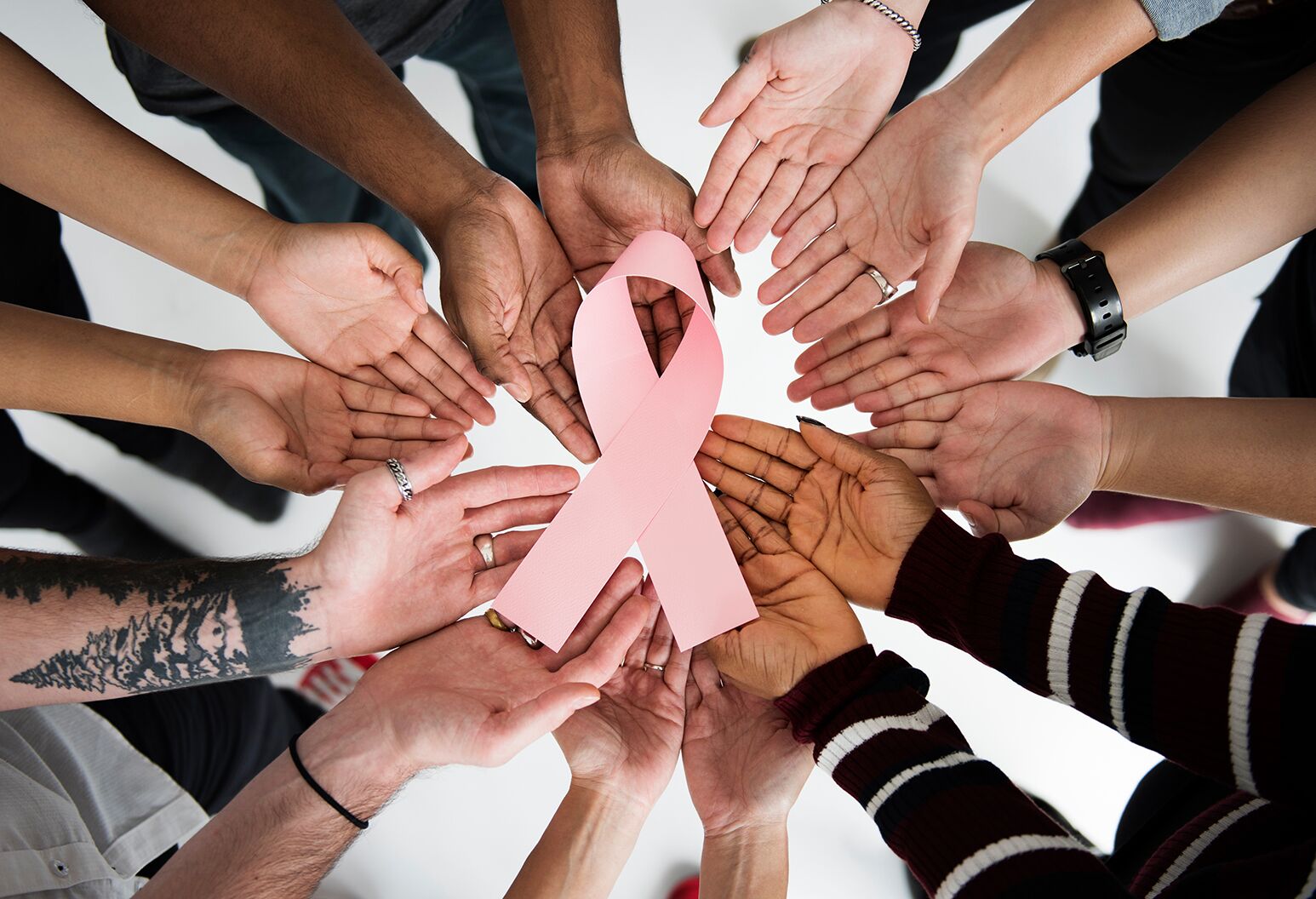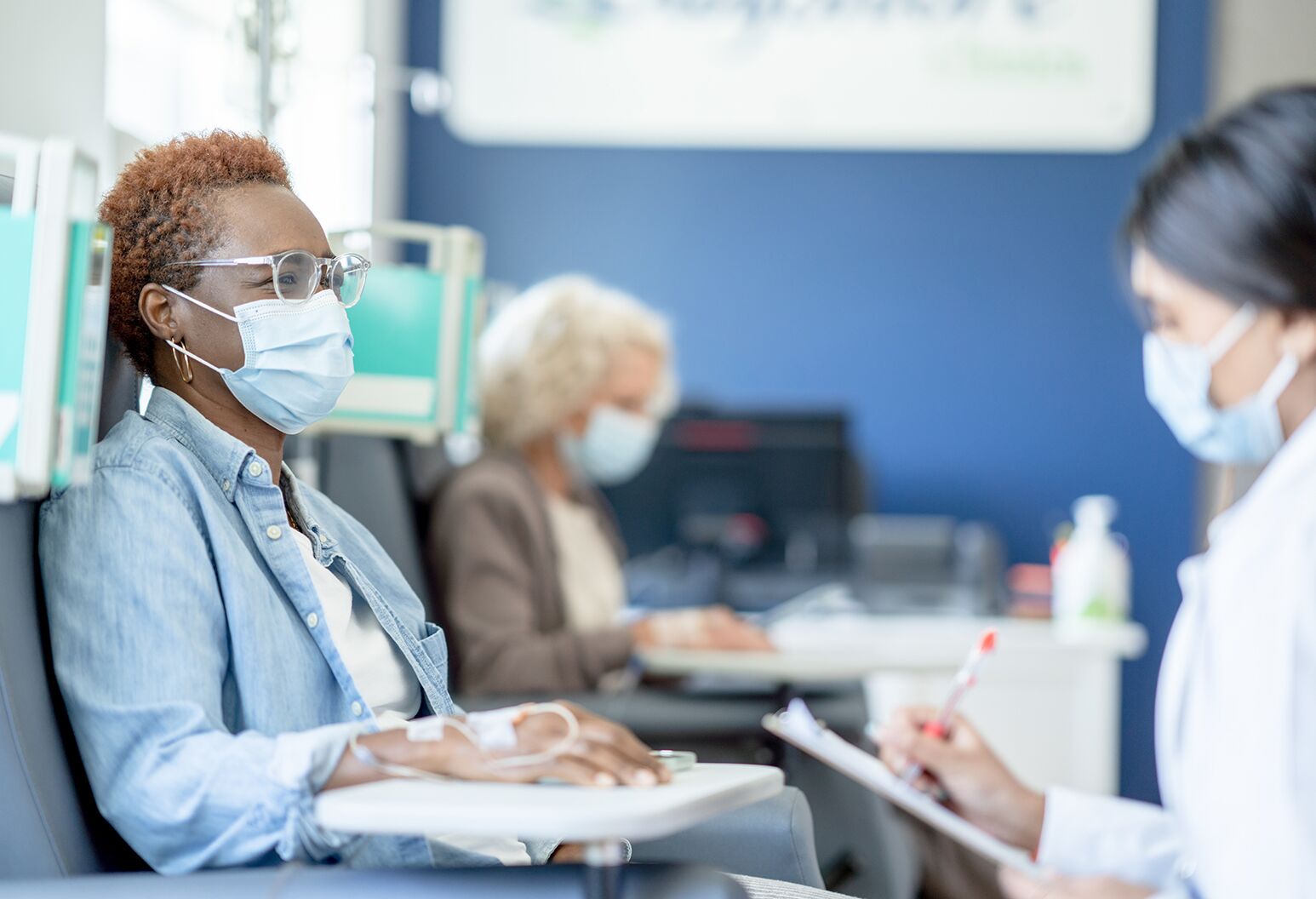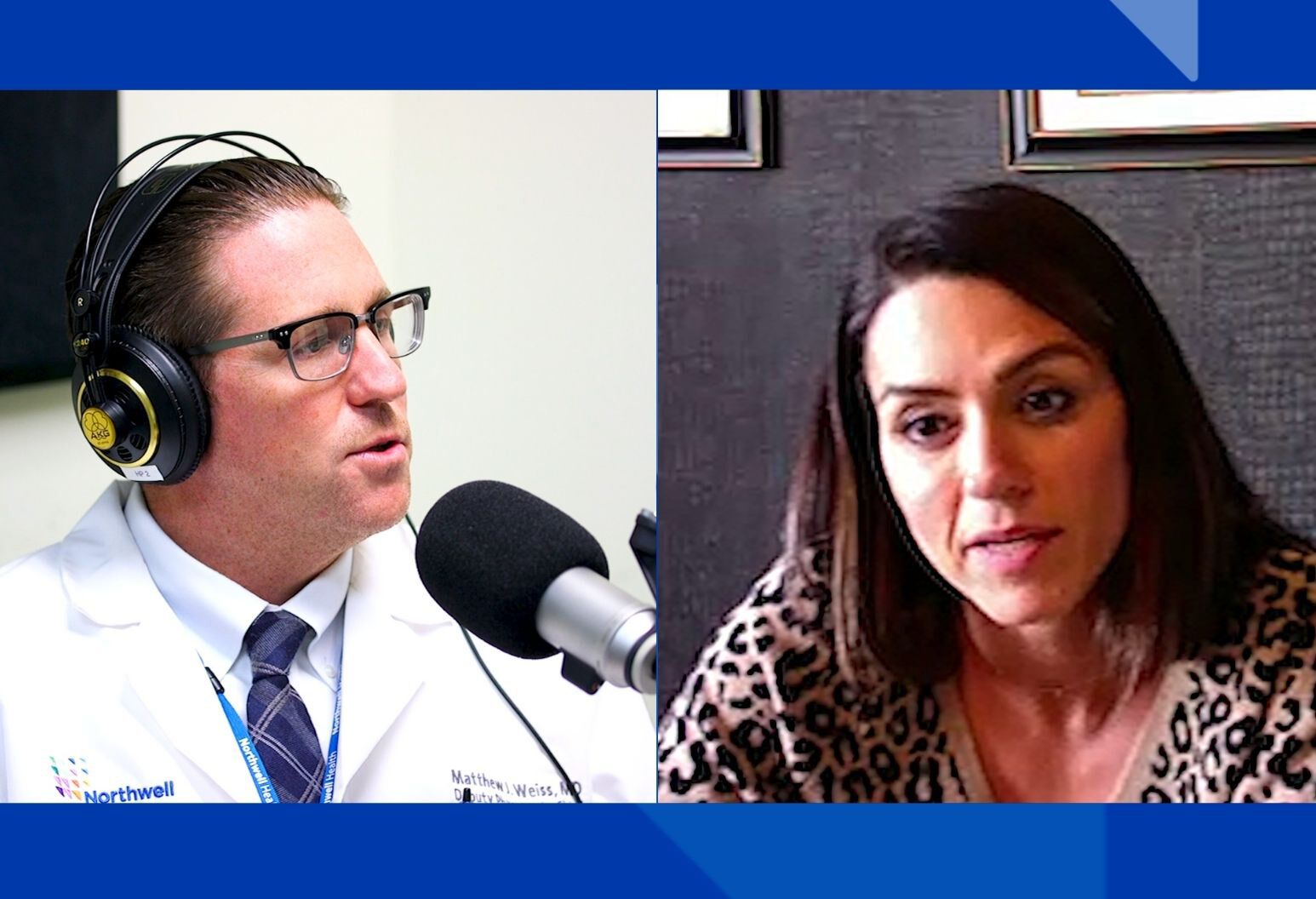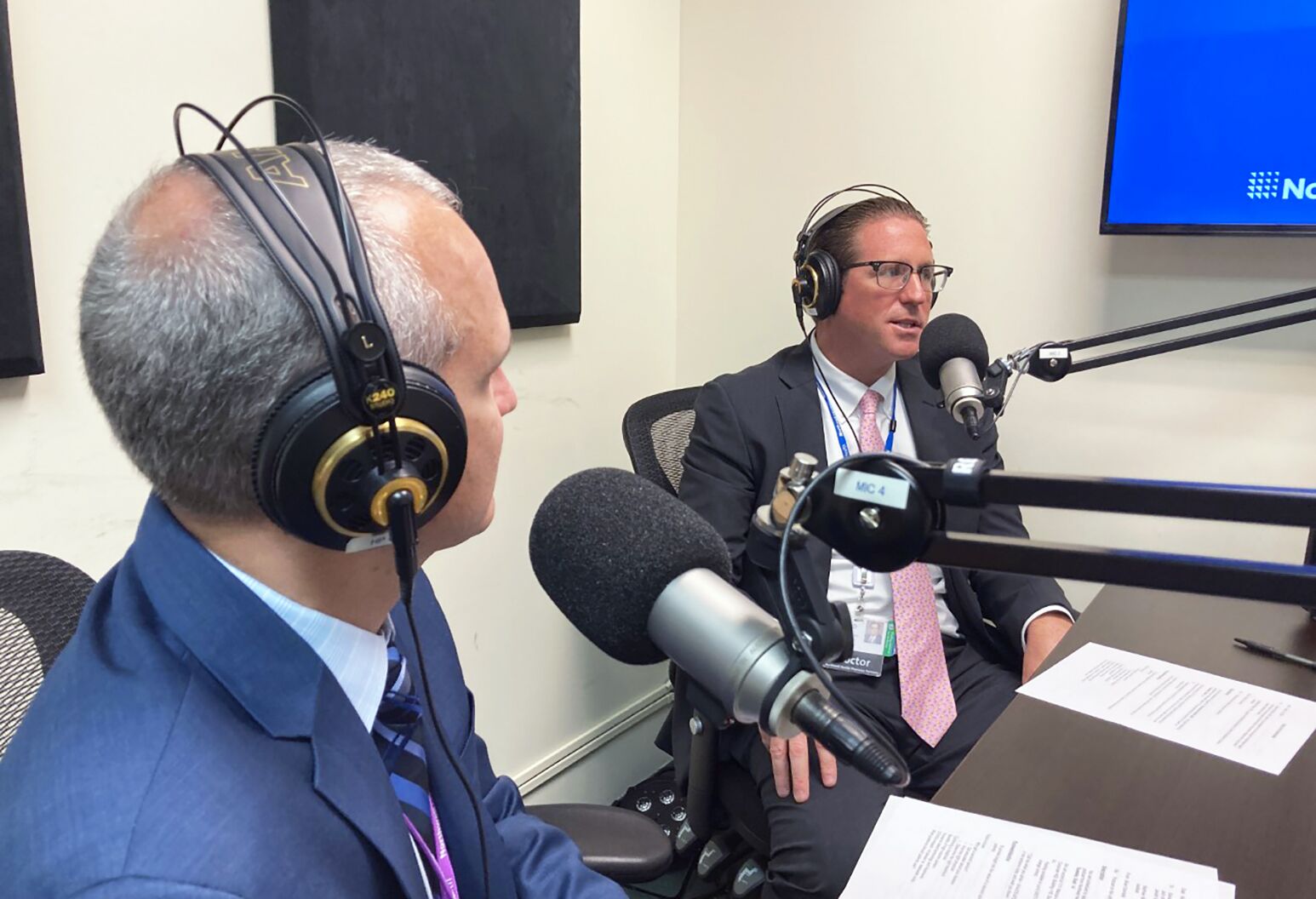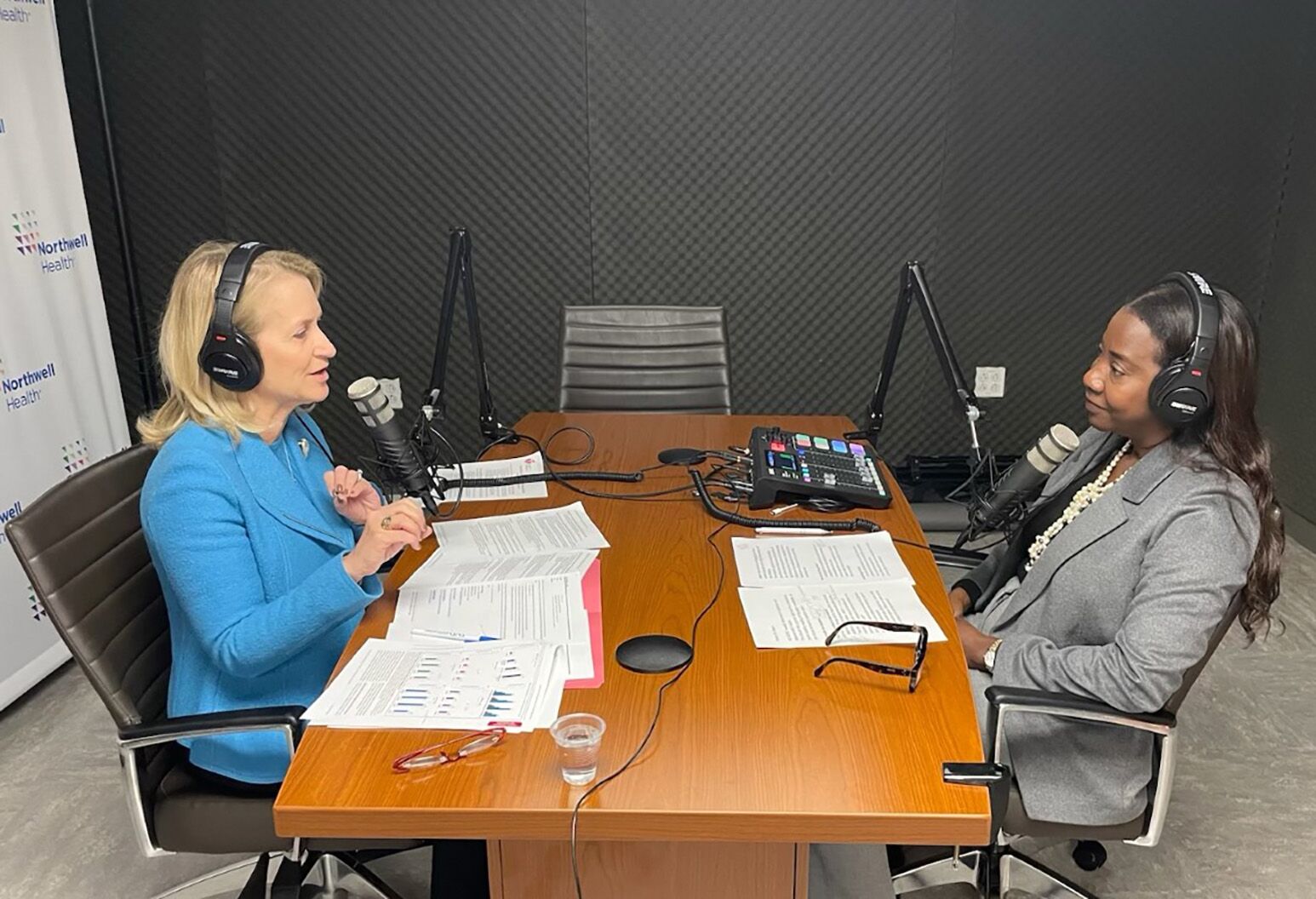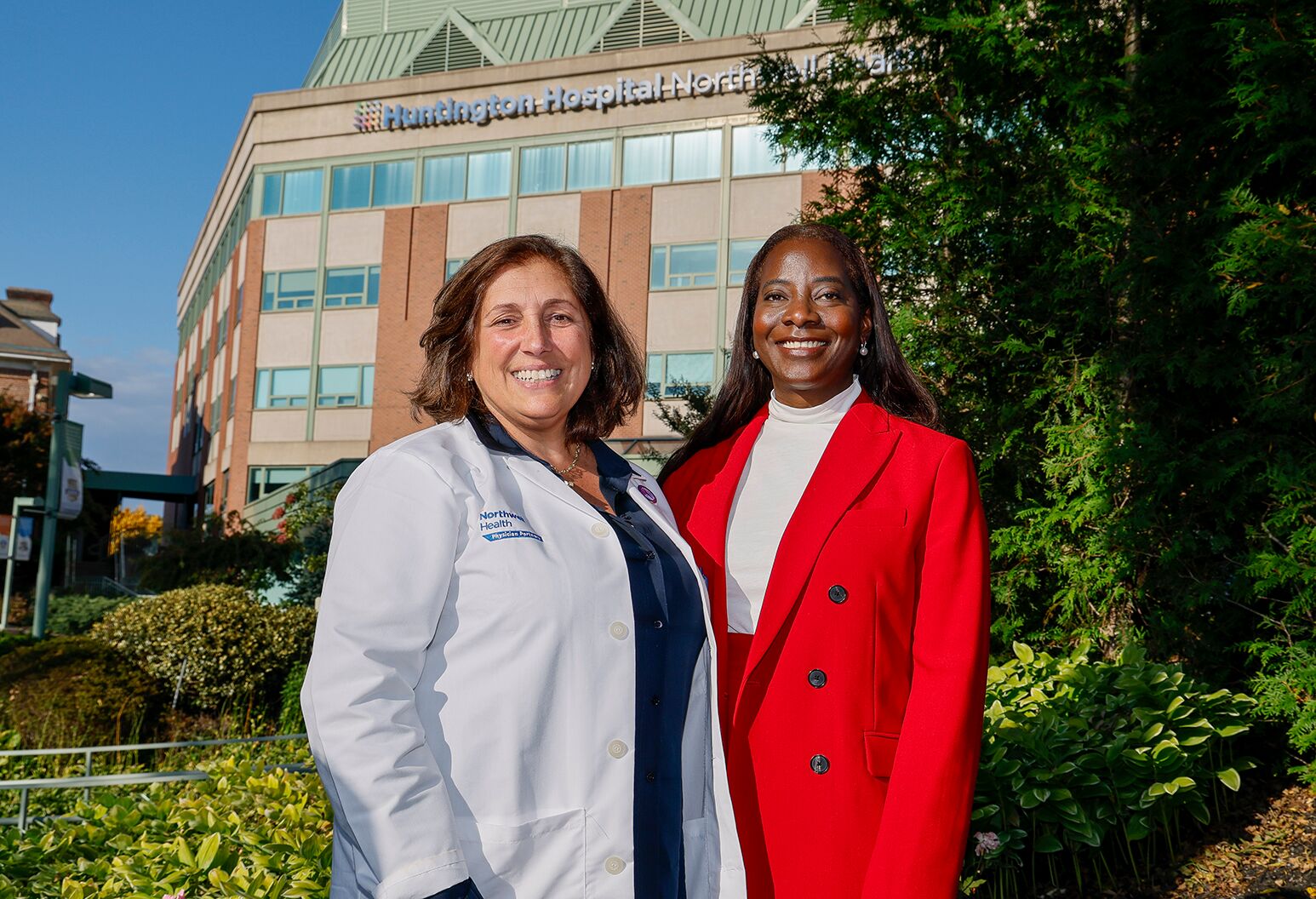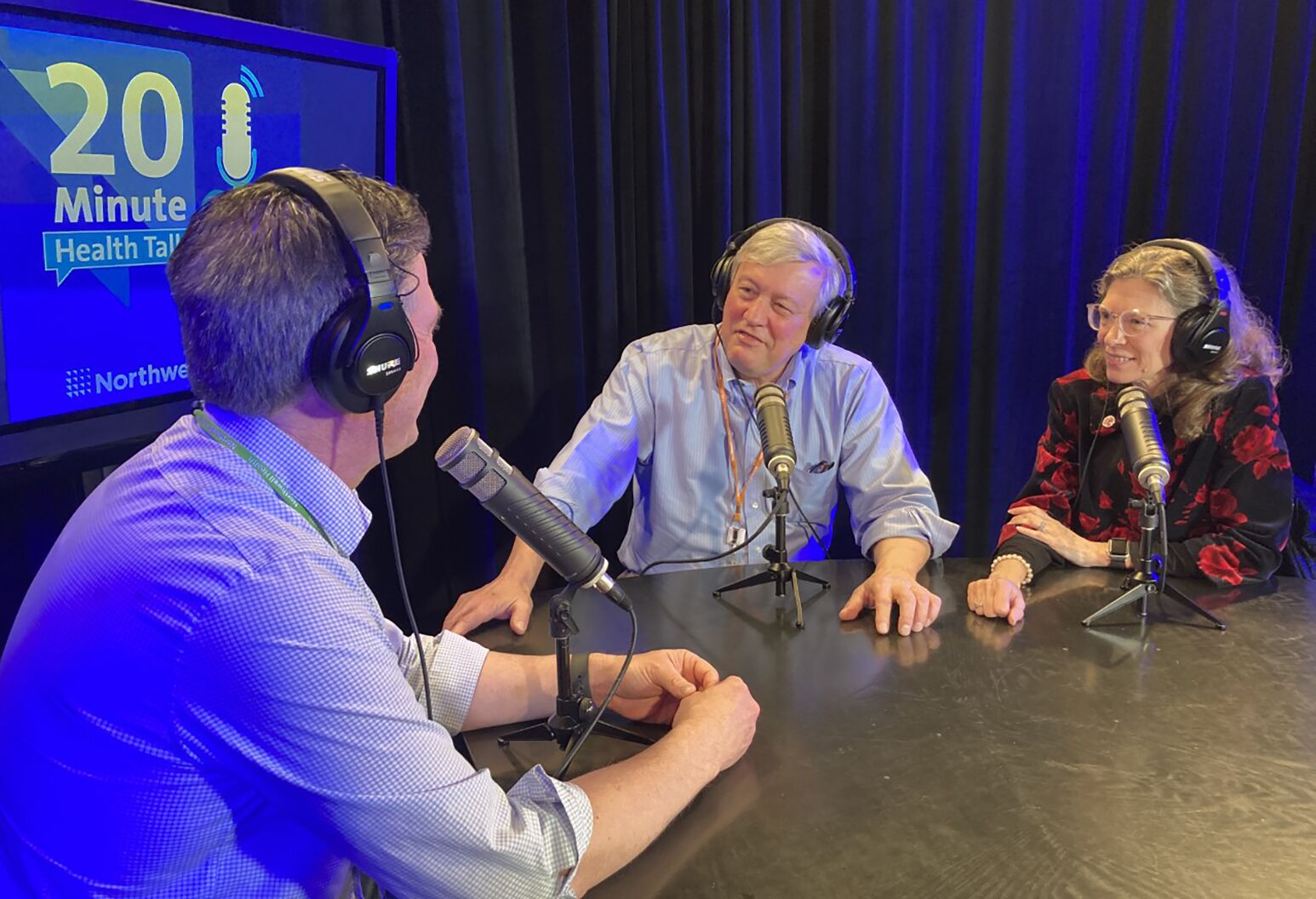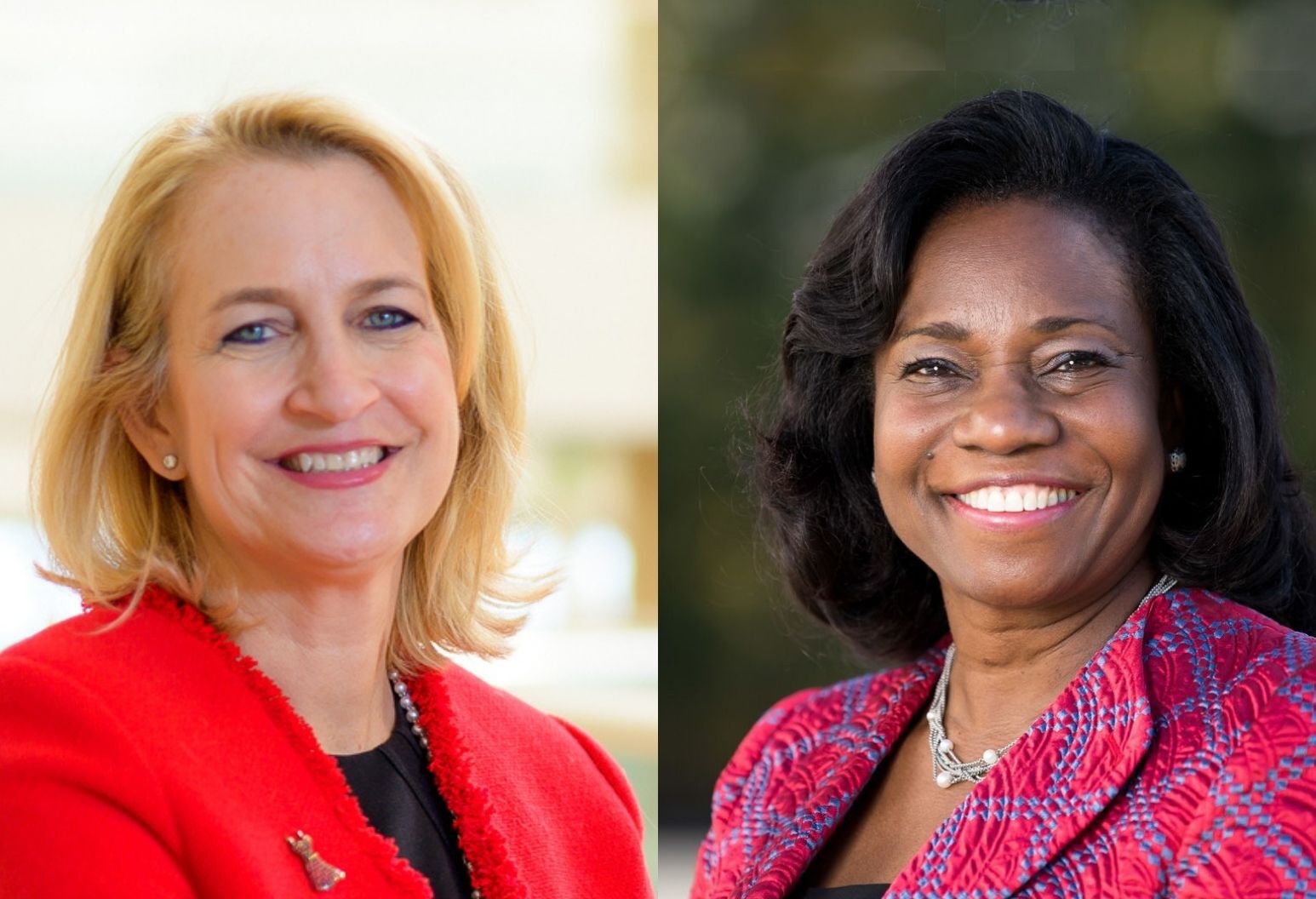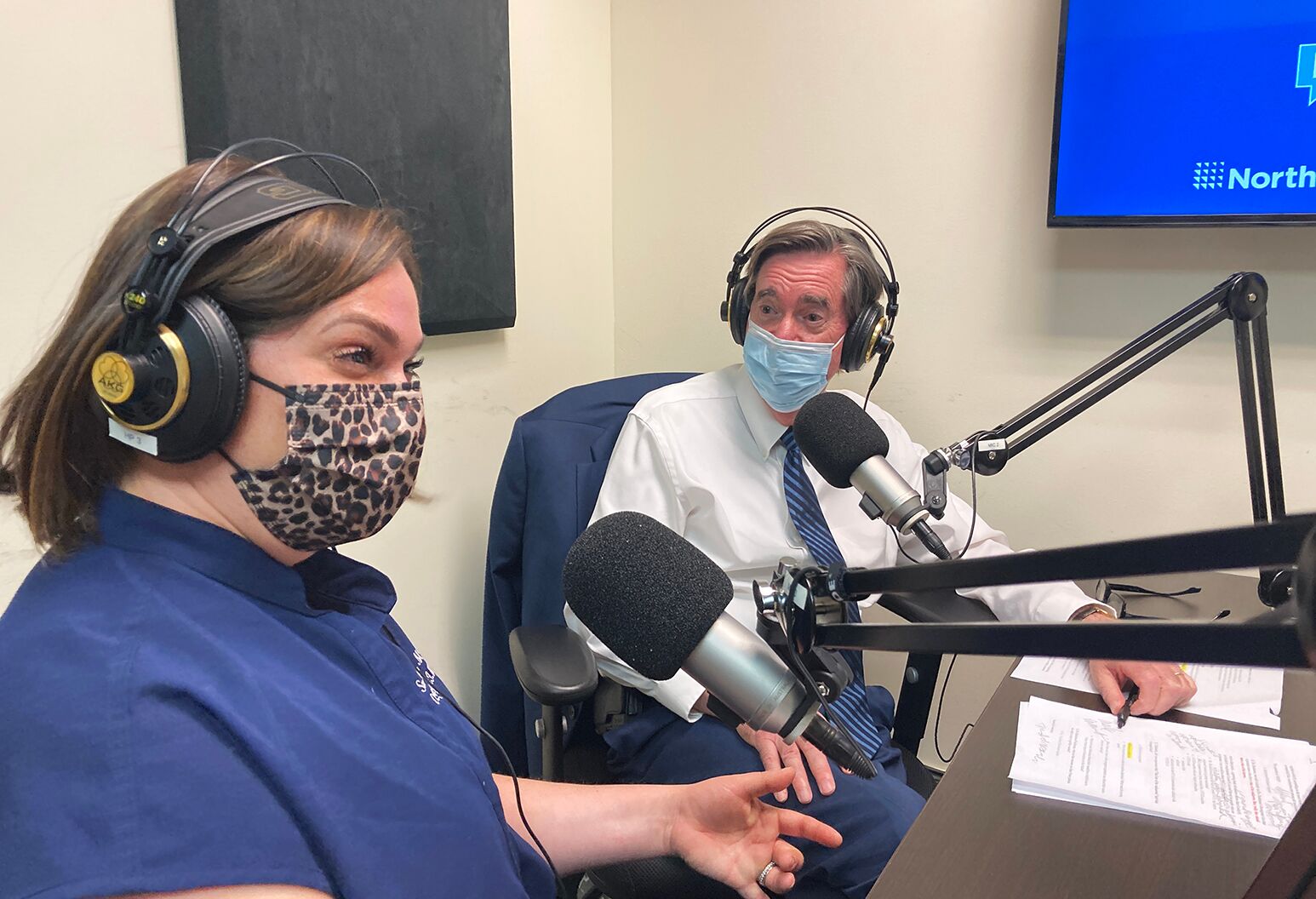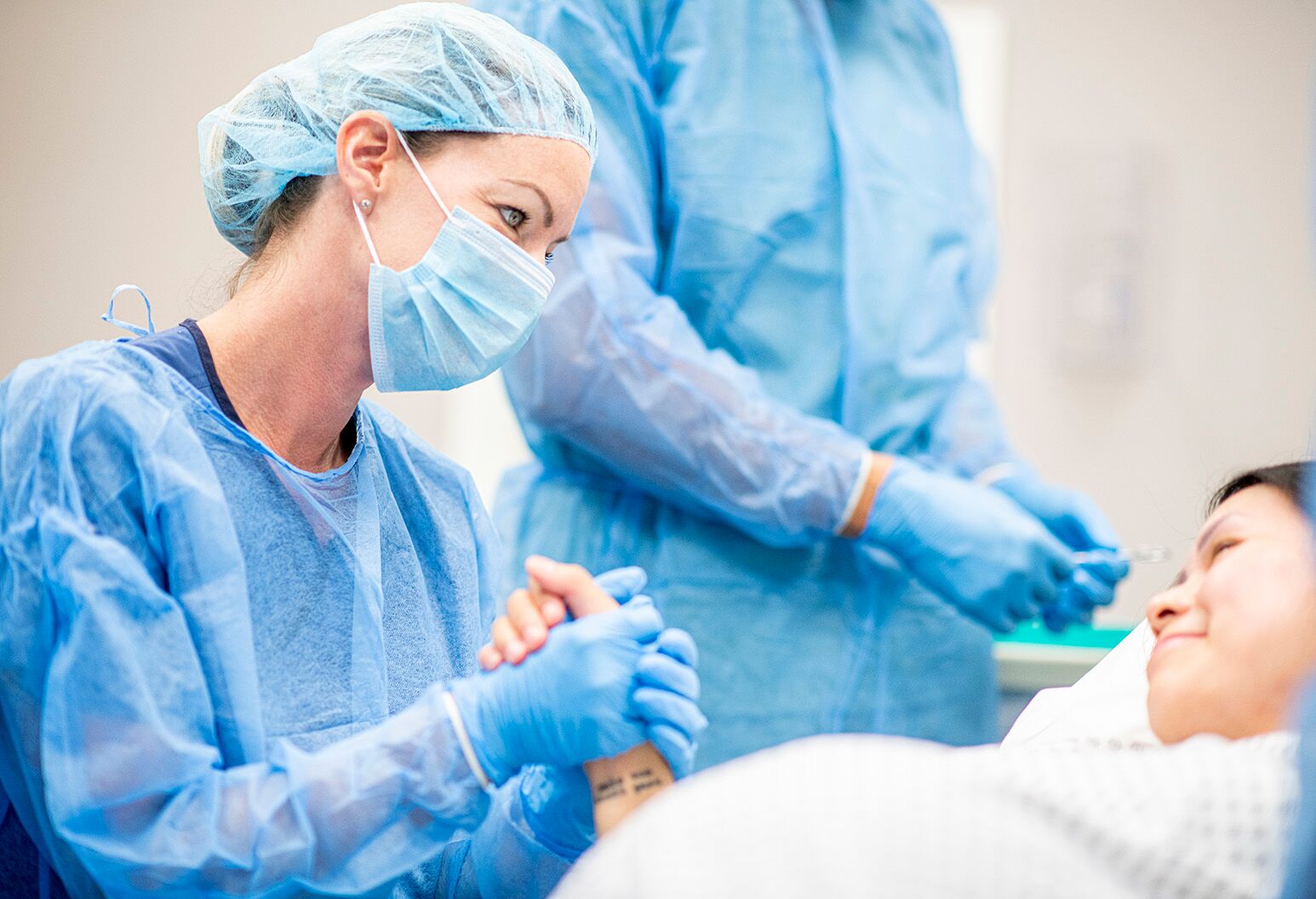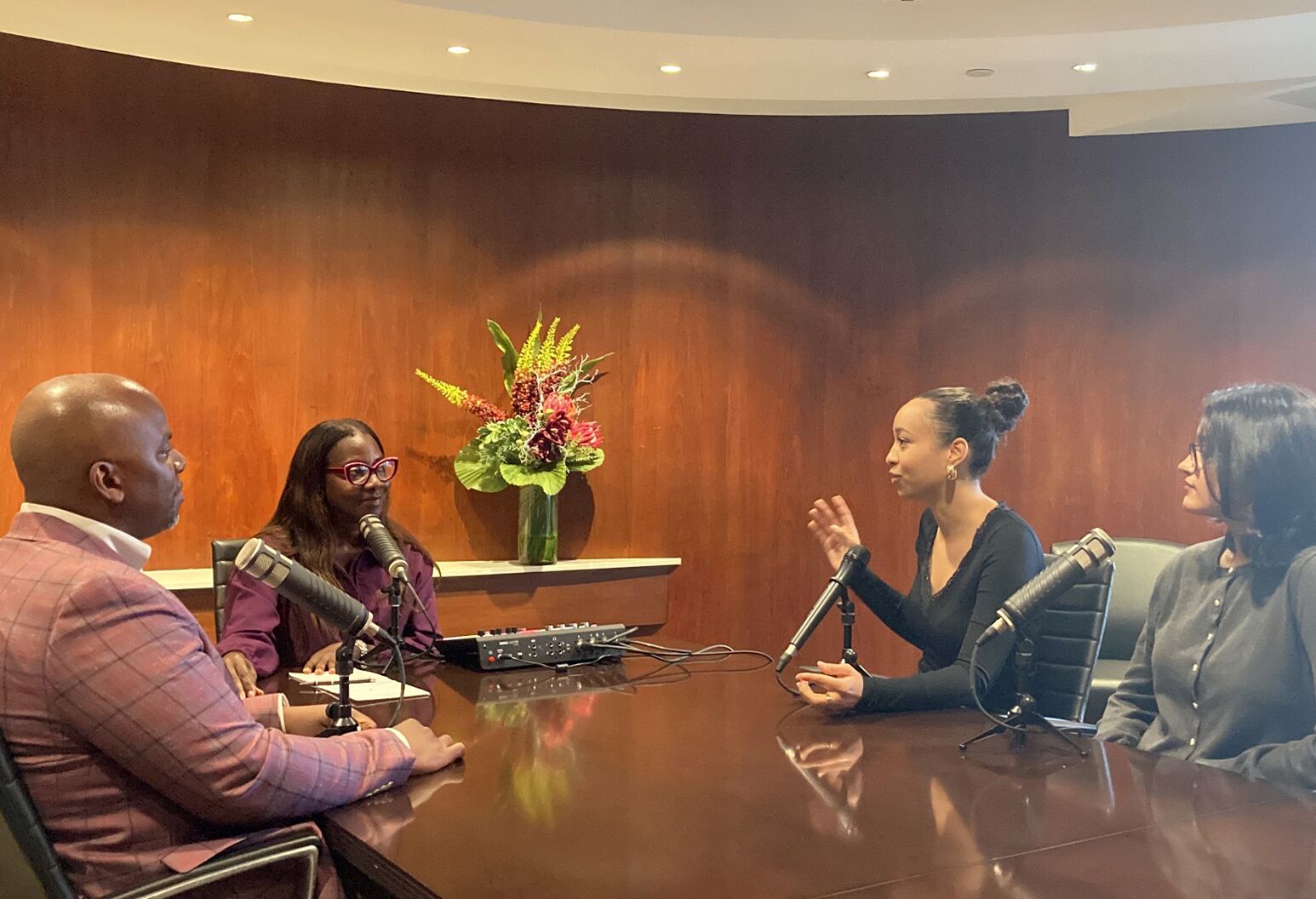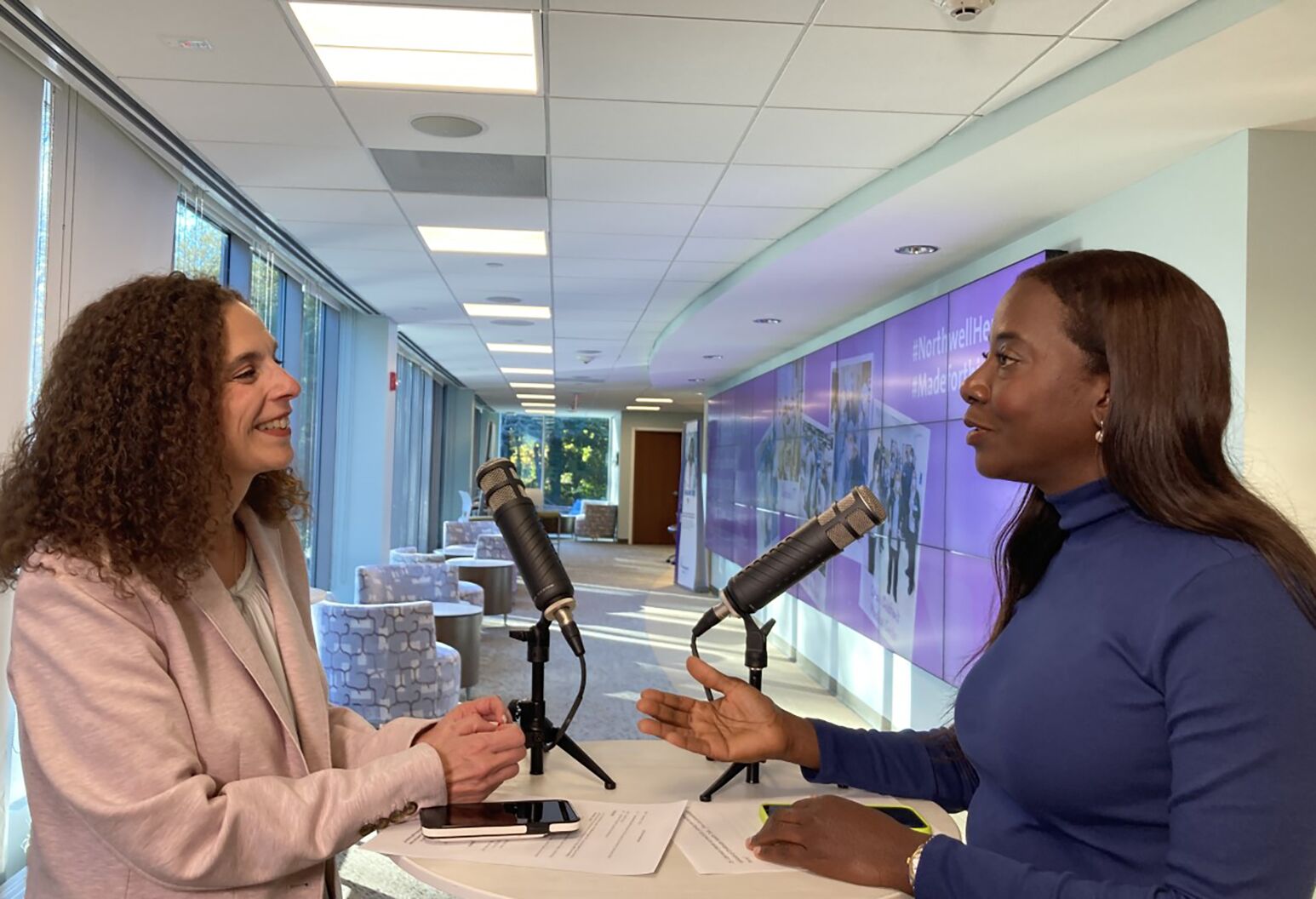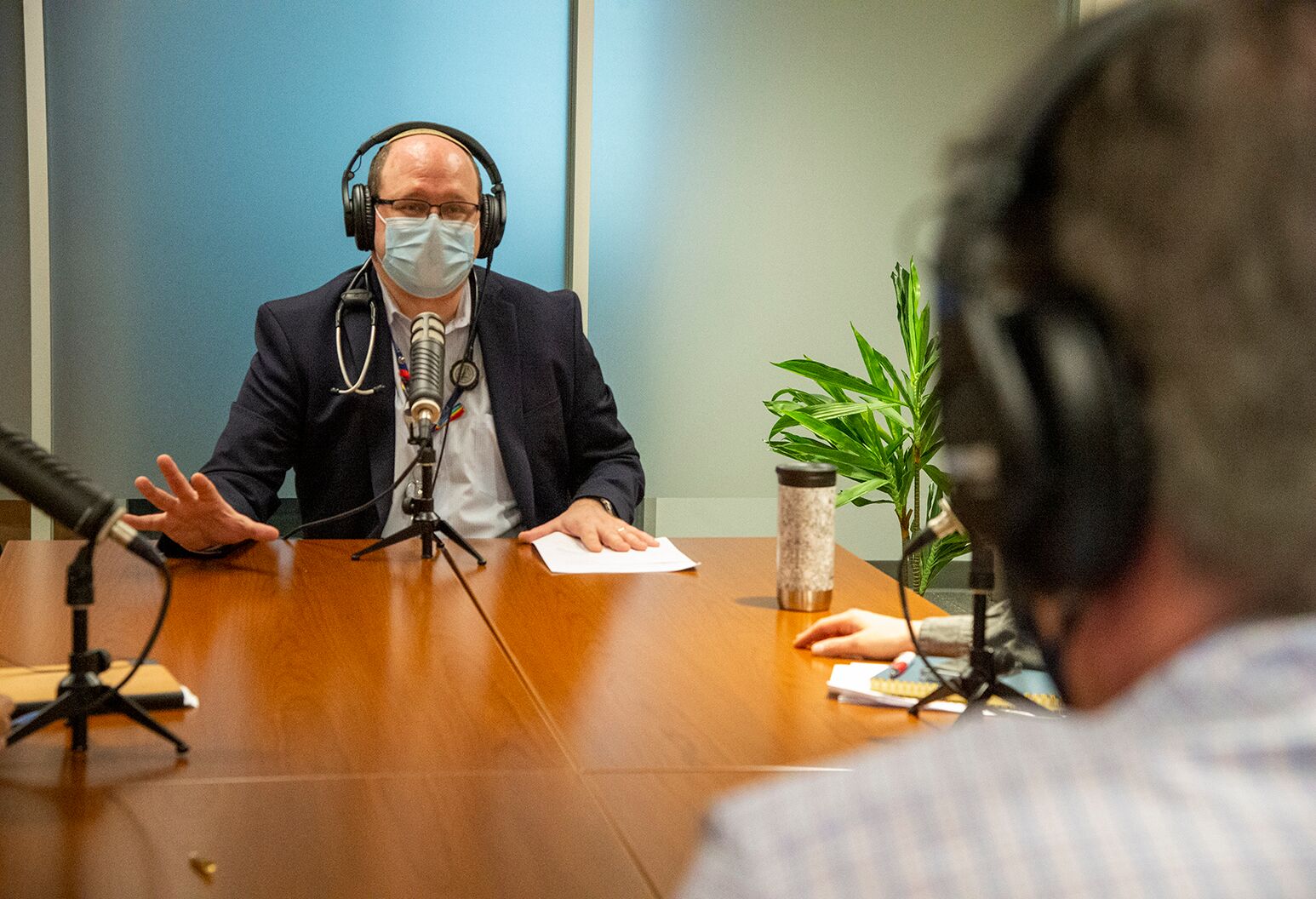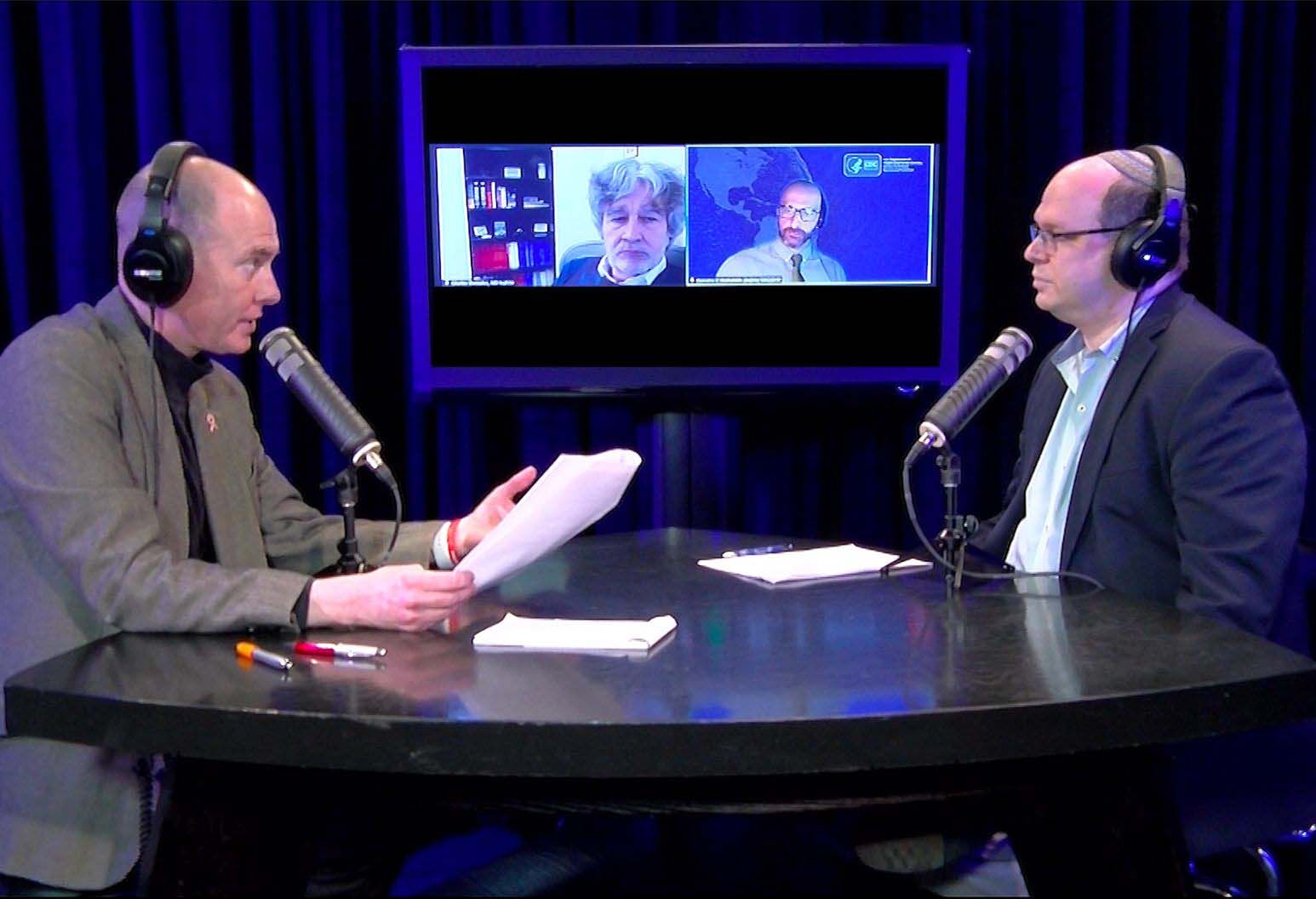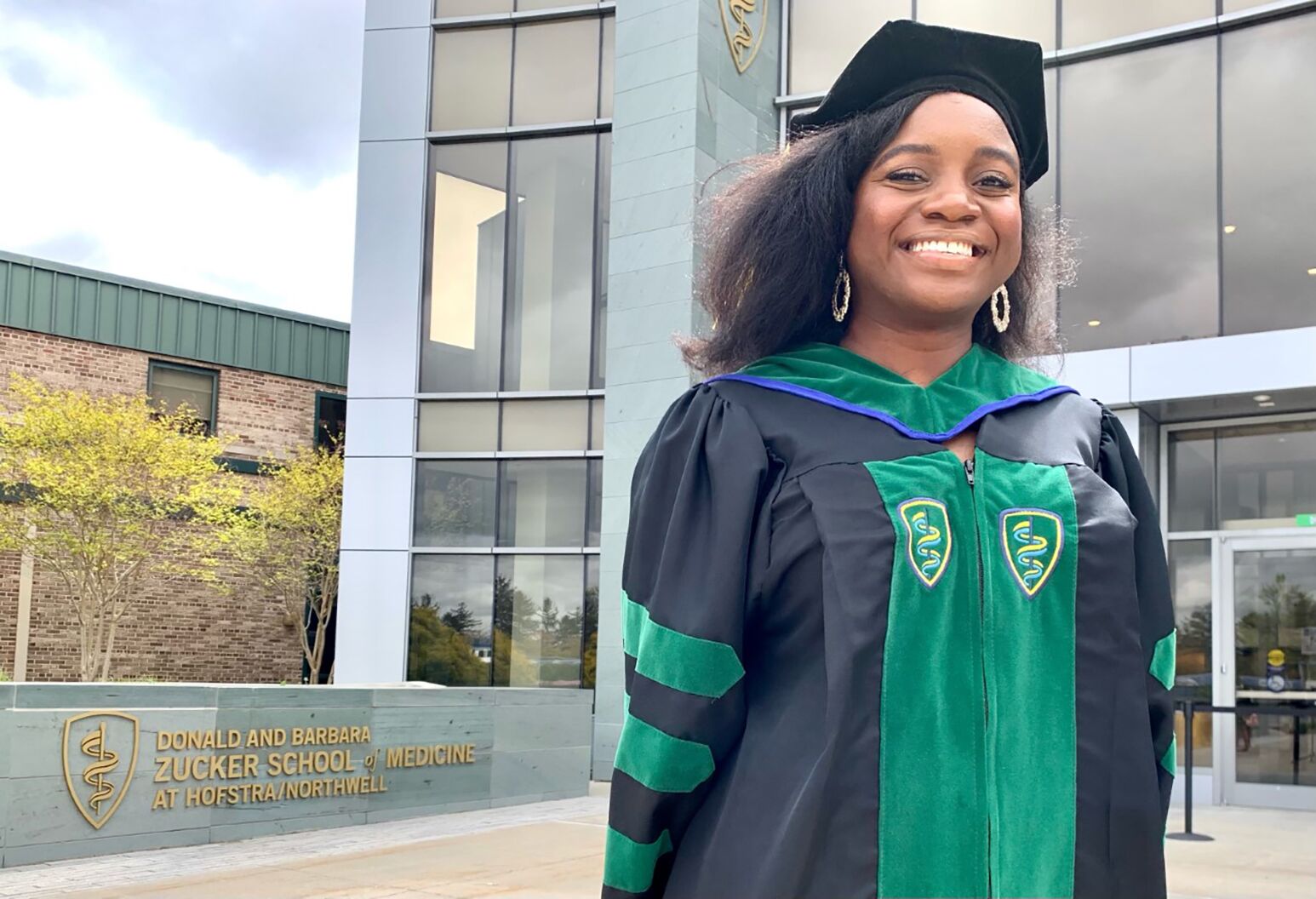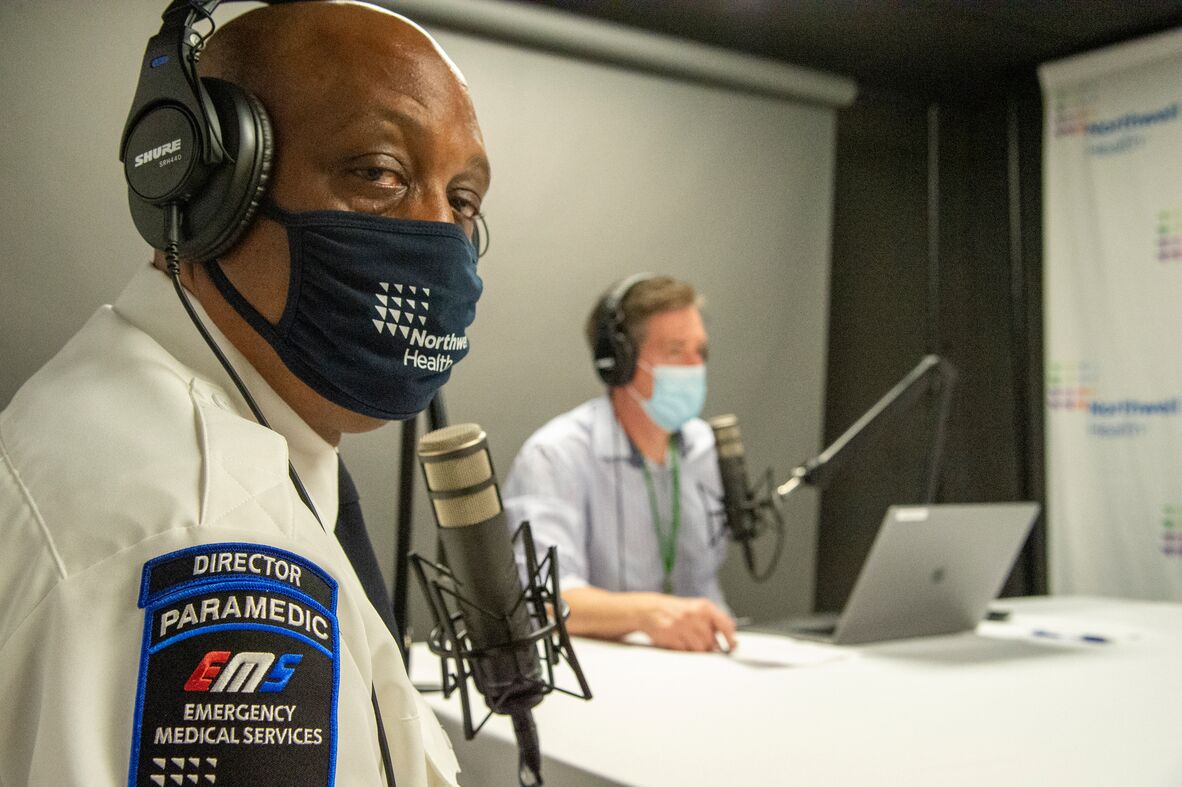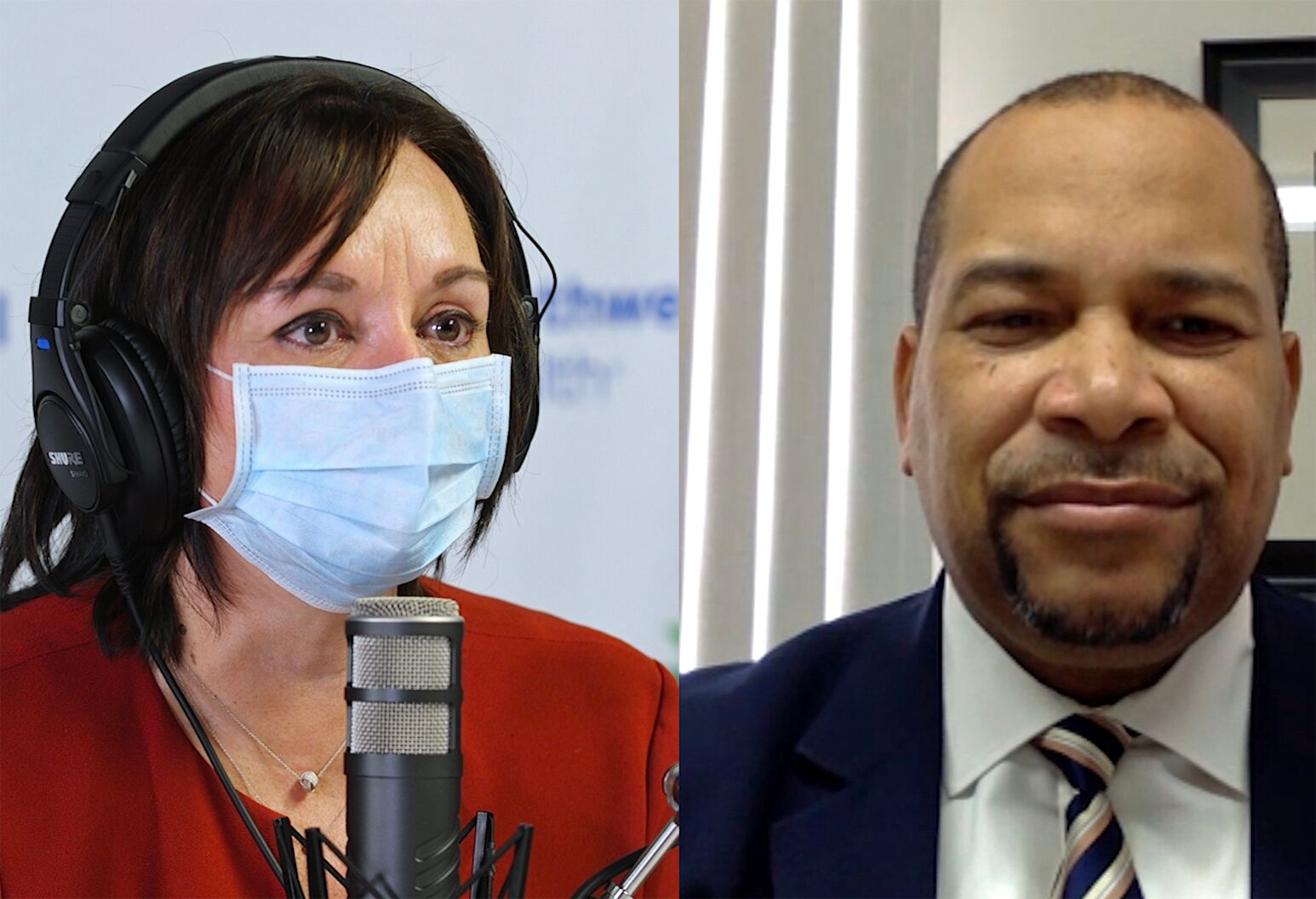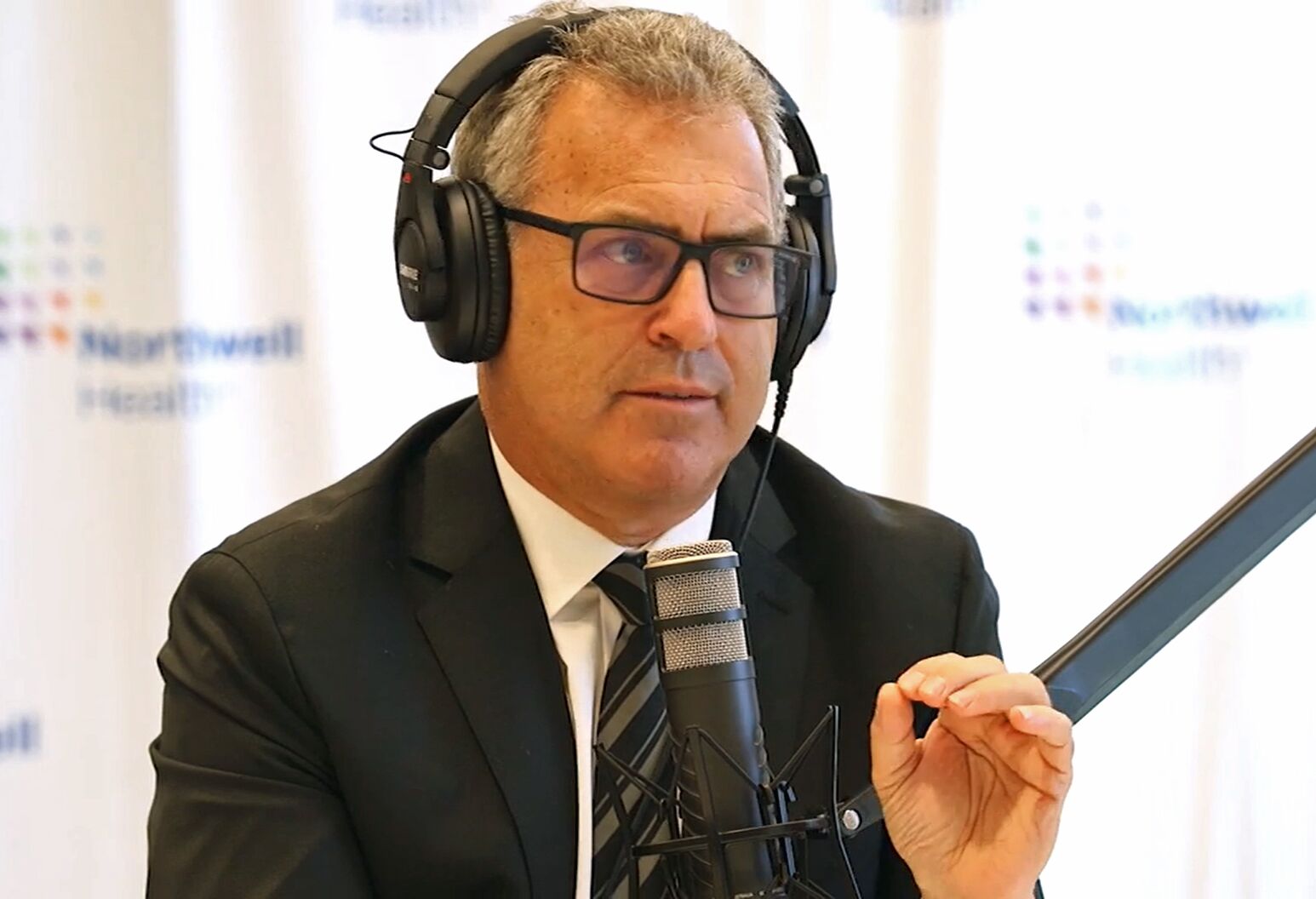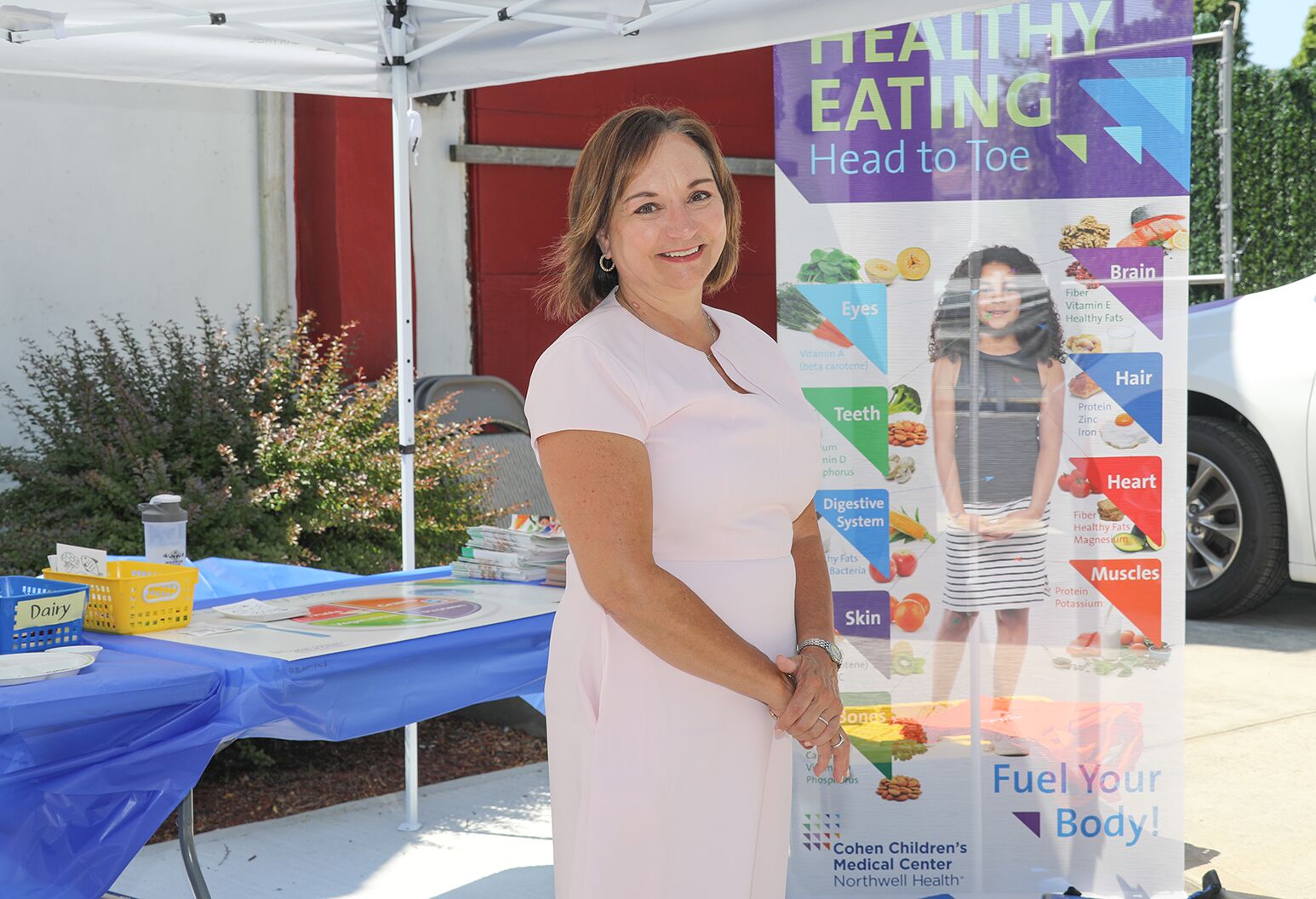20-Minute Health Talk

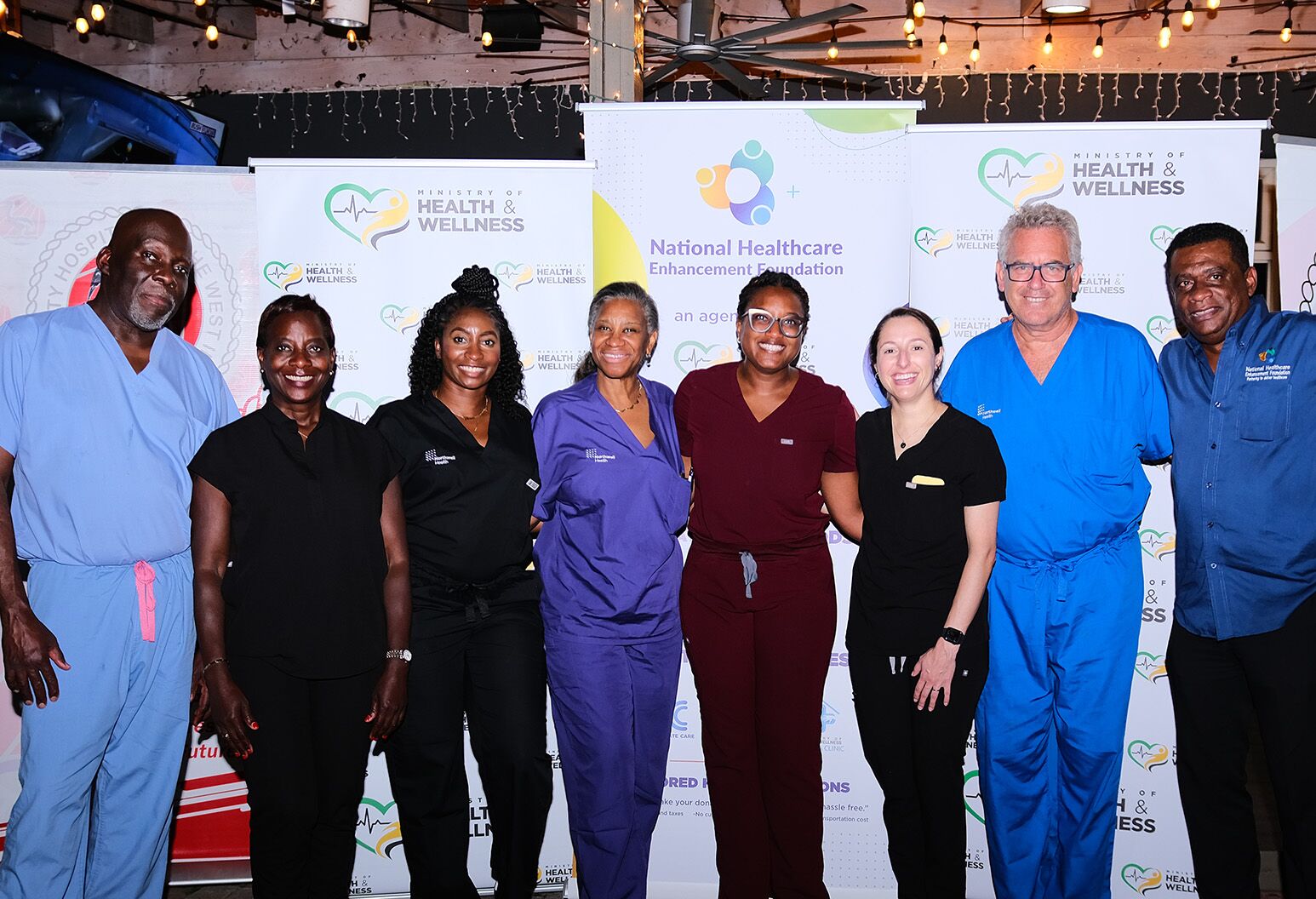



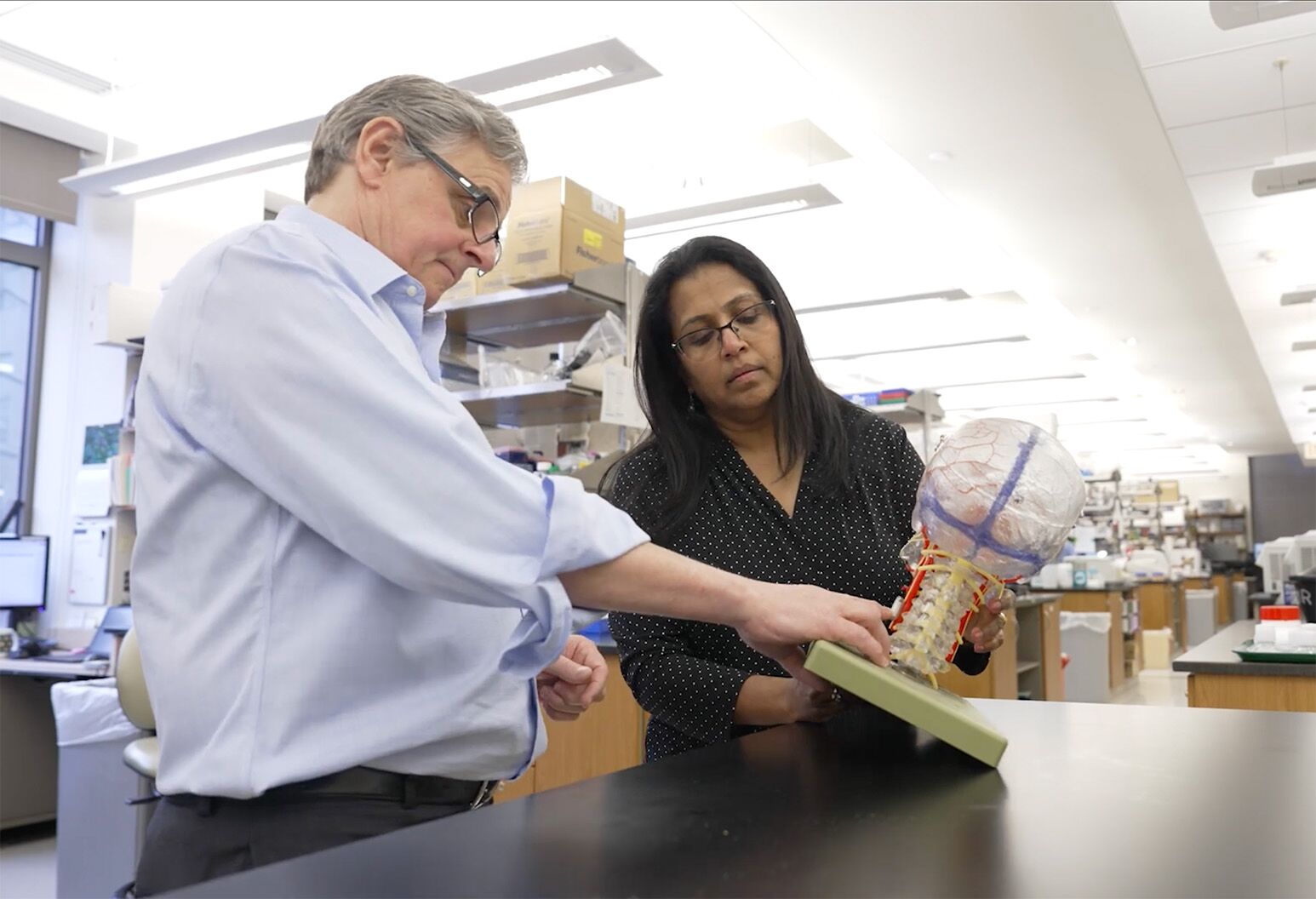
Show description
Northwell cares for more than any other health care provider in New York. Hear from their experts — some of the brightest minds in health care breaking down the latest news and developments. Hosted by Sandra Lindsay, DHSc, MA, MBA, RN, this award-winning health podcast helps patients and providers navigate topics ranging from cancer and Covid-19 to women's health and health equity.
Explore our episodes below.
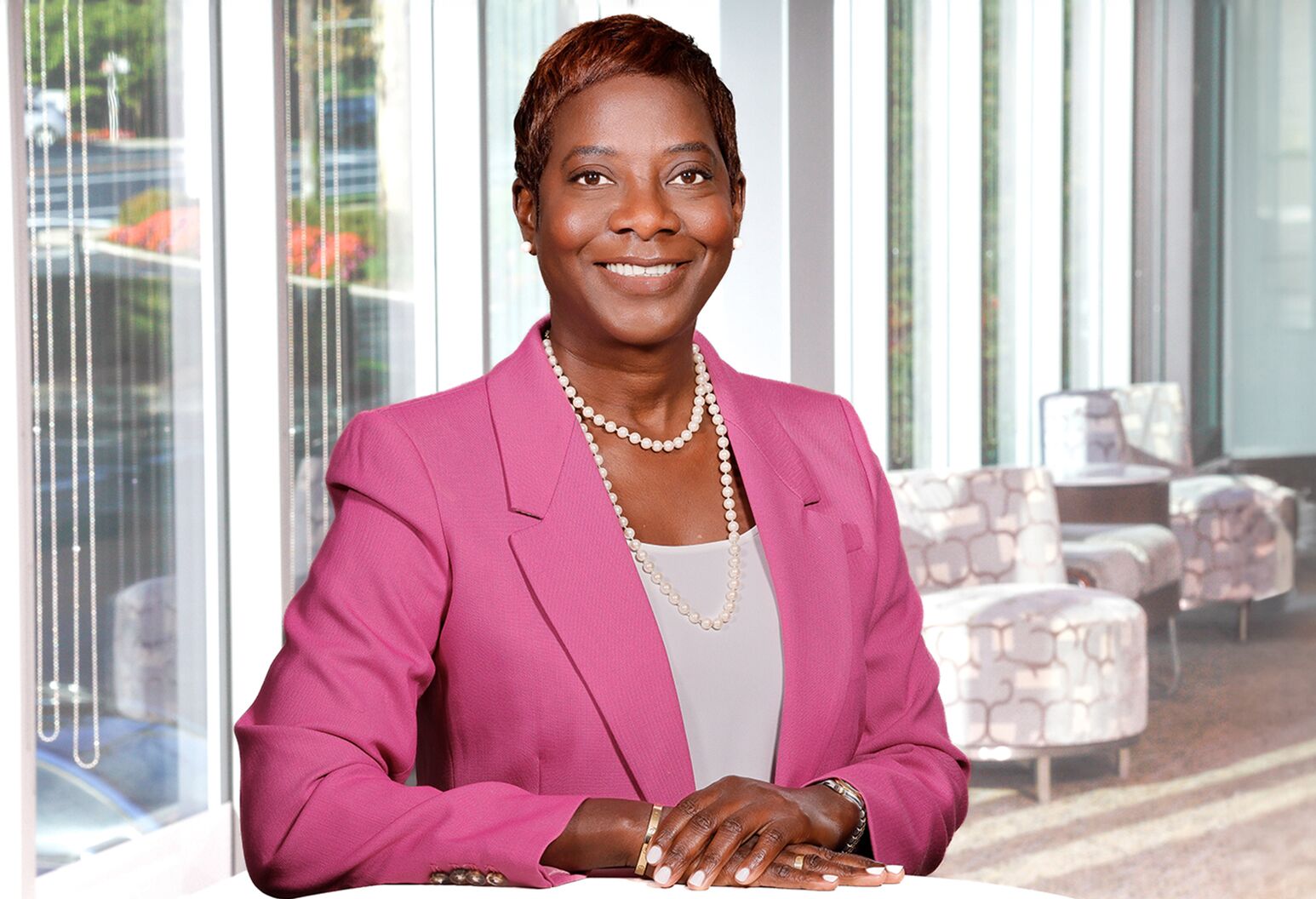
Dr. Lindsay is Northwell’s ambassador to raise health locally, nationally and globally. The vice president of public health advocacy for Northwell Health leads the health system in expanding knowledge of issues that affect community health, public policy and other aspects of health care.
Today marks five years since the World Health Organization declared Covid-19 a pandemic. To help us look back, Sandra Lindsay, RN, spoke with two leaders who were at the forefront of Northwell Health's response"
- Mangala Narasimhan, DO, director of critical care services for Northwell and medical director of the acute lung injury ECMO program
- John D'Angelo, MD, is the executive vice president and market president for Northwell Health’s Central Market
Like Dr. Narasimhan, Sandra was based out of Long Island Jewish Medical Center when Covid hit New York. At the time, she was head of critical care nursing at the flagship hospital. In this conversation, you’ll hear all three share their memories of what it was like inside some of the first U.S. hospitals to receive Covid patients in March 2020; how staff coped with this global pandemic and what measures and innovations helped turn the tide.
This is part 1 of their conversation. Check back for Part 2 Wednesday, March 12, and Part 3 on Thursday, March 13.
Colorectal cancer is the second leading cause of cancer deaths in the U.S. and, alarmingly, rates are rising in younger adults. On this 20-Minute Health Talk, Marc Greenwald, MD, discusses risk factors, symptoms, treatments and the importance of early screening. He also addresses common concerns about colonoscopy, from advances in prep to the lifesaving procedure itself, and helps listeners understand the importance of being proactive about their health.
Visit the newsroom page for chapters and more information.
About the expert
Dr. Greenwald is chief of colorectal clinical services; surgeon-in-chief; and director of the rectal cancer program at North Shore University Hospital.
There are more Jamaicans living abroad than on the Island itself, a fact not lost on Courtney Cephas. As director of the National Healthcare Enhancement Foundation (NHEF), the philanthropic arm of Jamaica's Ministry of Health and Wellness, he wants to tap into this large and charitable community — referred to as the diaspora — to improve health care in Jamaica. In this episode of 20 Minute Health Talk, Cephas joins host Sandra Lindsay, RN, herself a member of the diaspora eager to give back, to discuss the NHEF's work, including its focus on building sustainable partnerships with organizations like Northwell Health, to address critical needs. Cephas and Lindsay detail two recent trips by Northwell clinical teams to the island, where they provided free surgeries for women suffering from uterine fibroids — one of several surgeries that have been backlogged since Covid-19, leaving hundreds desperate for a solution. These trips represent a powerful example of the diaspora's impact, bringing relief to patients while also strengthening Jamaica's healthcare system for the future. Hear how this unique collaboration is transforming lives and learn about the NHEF’s work to create a healthier future for Jamaica.
Future episodes will feature the inspiring personal stories of the women whose pain, resilience, and renewed hope embody the spirit of this initiative.
Most of us have heard of kidney transplants, and maybe even know someone who's received a kidney from a living donor — typically a family member or a friend. But did you know that living donation is also possible for livers? It's an incredible procedure, and we're diving deep into this often-overlooked life-saving option. Northwell recently launched Long Island's first living donor liver transplant program, and today we're speaking with the expert leading the charge, Nabil Dagher, MD. He'll explain how this amazing procedure works – including how the liver can actually regenerate – why it's so important, and what you need to know about the growing need for organ donors across the U.S.
Sepsis rarely attracts the attention of the public, but it's distressingly common: Every year, about 1.7 million U.S. adults develop this overreaction to infection — and more than 350,000 of them die. On this bonus episode of 20-Minute-Health-Talk, you’ll hear the stories of doctors and patients fighting against this subtle yet deadly condition, and how the battle led to a global alliance to combat the silent killer. You’ll also hear how pioneering research and lifesaving protocols developed at the Feinstein Institutes for Medical Research and Northwell Health have reduced sepsis-related deaths — both within their hospitals, throughout New York State, and around the world.
In this special New Year’s edition of 20-Minute Health Talk, host Sandra Lindsay, RN, welcomes Jaclene Jason, PhD, clinical psychologist and senior director of Behavioral Health and Addiction Services at South Oaks Hospital, to reflect on the delightful wisdom shared by kids in Northwell Health’s latest TV commercial, A Little Wisdom. From embracing play to reframing fear, these young voices remind us how simple shifts in perspective can lead to a healthier, happier 2025. Dr. Jason reacts to their advice and offers practical tips to help parents embrace these ideas, fostering wellness and joy for the whole family.
You can also listen to this 20-Minute Health Talk on:
As 2024 comes to a close, we look back on five exciting medical advances coming from the Feinstein Institutes for Medical Research — the research arm of Northwell Health. In this episode, we spotlight studies that made strides in the treatment of Alzheimer's disease, lung disease, mental health and dysphagia.
Read more about these five notable Northwell advances of 2024.
What if the key to treating chronic diseases like rheumatoid arthritis wasn't drugs but a tiny electrical device? That's the promise of vagus nerve stimulation (VNS), a groundbreaking therapy that holds the potential to transform how we approach conditions like asthma, heart disease, diabetes, obesity, and even depression and other mental health issues. On this 20-Minute Health Talk, we explore the fascinating science and remarkable potential of VNS with two leading experts: Kevin Tracey, MD, president & CEO of the Feinstein Institutes for Medical Research and the founder of bioelectronic medicine; and Murthy Simhambhatla, PhD, president & CEO of SetPoint Medical, a company pioneering cutting-edge VNS devices.
Together, they discuss the history of VNS, its applications today and the potential to address a wide range of other inflammatory conditions, from multiple sclerosis to inflammatory bowel disease (IBD). They also dive into the early results of a SetPoint-led study using VNS to treat rheumatoid arthritis, which Dr. Tracey believes could be the tipping point in this over 30-year odyssey.
Read more about this on the Northwell Newsroom.
With fewer smokers today, the number of Americans getting lung cancer has dropped. However, the decline has been slower in women. Not only are they diagnosed, on average, at a younger age than men, but multiple studies have found that women between the ages of 30 and 49 are developing the disease at higher rates compared to men in the same age group. November is lung cancer awareness month: In this episode, lung cancer experts Brett Bade, MD, and Nagashree Seetharamu, MD, MBBS, join host Sandra Lindsay, RN, to discuss the alarming trend in women and to raise awareness about lung cancer screening in general; currently, less than 10% of people who should be checked for lung cancer actually get screened. Learn the criteria for screening, what the scan is like and how to lower the risk of developing the disease.
Read more about this episode on the Northwell Newsroom.
Chapters:
- 02:34 - Lung cancer risk factors
- 03:32 - Health effects of smoking
- 04:11 - Second hand smoking
- 05:14 - Are there early signs of lung cancer?
- 05:54 - What is lung cancer screening?
- 07:37 - Low-dose CT lung cancer screening
- 08:27 - Who is eligible for screening?
- 08:50 - What if you don't qualify for screening but have a risk factor?
- 10:31 - What barriers to screening exist?
- 11:28 - Low screening numbers
- 12:45 - Lung cancer in young women
- 14:15 - Sex differences in lung cancer
- 14:34 - Differences in lung cancer in women
- 15:41 - EGFR mutation and lung cancer
- 16:19 - EGFR, Asian woman and lung cancer
- 17:13 - Breaking down racial disparities
- 18:49 - Barriers to lung cancer screening
Ovarian cancer, often referred to as the "silent killer," has been misunderstood for years. In this episode of 20-Minute Health Talk, Jill Whyte, MD, a leading gynecologic oncologist at Northwell Health, demystifies the subtle symptoms that frequently go unnoticed and emphasizes the critical role of early diagnosis — particularly for those at the highest risk of ovarian cancer. She also explores the latest advances in treatment, from targeted therapies like PARP inhibitors, to minimally invasive surgeries and new preventive strategies. Prophylactic fallopian tube removal has been the standard of care for those at the highest risk but is now being used in certain situations for women at average risk.
During Ovarian Cancer Awareness Month in September, Dr. Whyte implores women everywhere to educate themselves and their family and friends to help reduce the impact of this deadly disease.
Read more about ovarian cancer treatments and Dr. Whyte's research.
Chapters:
01:15 - Ovarian cancer prevalence, trends
01:54 - Ovarian cancer symptoms
04:20 - PARP inhibitors and other ovarian cancer treatments
06:00 - Ovarian cancer risk factors
06:38 - Surgery types
08:38 - Strategies to prevent ovarian cancer
10:30 - The role of the fallopian tubes
14:50 - Catching ovarian cancer early
15:17 - Genetic testing
16:12 - Northwell's Cancer Institute
17:15 - Patient navigators
Surgery is supposed to lead to relief. For as many as 40% of inflammatory bowel disease patients, though, it leads to post-operative complications, which often lead to more surgery. It’s one of several problems facing IBD care, a field in which not enough specialists are available to accurately diagnose and treat it, medicinally or surgically. Gastroenterologist Feza Remzi, MD, recognizing this, helped form a Center for Advanced Inflammatory Bowel Disease Care at Northwell, which he’s led since April 2024. On this episode, Dr. Remzi discusses the disease and explains the work his Center is doing to improve care for patients across the country.
Chapters:
- 00:02 - Intro
- 3:35 - Dr. Remzi's journey
- 4:21 - What is IBD?
- 5:10 - Ulcerative colitis
- 6:48 - Crohn's disease
- 7:14 - Diagnosing IBD
- 7:40 - Medication
- 9:56 - Surgery
- 10:39 - J pouch surgery
- 12:22 - Strictureplasty
- 13:04 - What keeps people from surgeries they need?
- 14:50 - The idea for the IBD Center
- 15:48 - What is the IBD Center?
- 19:44 - IBD research at the Feinstein Institutes
- 20:41 - The Center's tissue bank
- 21:37 - Treating patients today
- 22:43 - Outro
Only 20 people survived the collapse of the Twin Towers and were pulled from the rubble on September 11, 2001. Two of them were saved by Scott Strauss and Eddie Reyes. The now-retired NYPD police officers joined 20-Minute Health Talk on the 20 anniversary of 9/11 in 2021 to share their stories and discuss the long-term health hazards they live with as a result of exposure to toxic fumes. Today, 23 years to the day, we revisit this somber, but important conversation, which also involved Jacqueline Moline, MD, MSc, who directs the Northwell Health World Trade Center (WTC) health program in Queens. She is also senior vice president of Northwell’s Occupational Medicine, Epidemiology and Prevention department. She explains who qualifies, how it benefits 9/11 first responders and lessons learned from her experience leading the WTC health program.
More resources:
- World Trade Center health program improves survival, longevity for 9/11 first responders
- Retired NYPD officers: We dug through the World Trade Center rubble, looking for our brothers
- New trial tracks long-term effects of burn pit exposure among veterans
- Burn pits: Understanding the problem, identifying solutions
- 5 ways to improve veterans health care services
In Part 2 of our conversation on 20-Minute Health Talk, Sandra Lindsay, RN, continues the discussion with the creators of HBO’s One South: Portrait of a Psych Unit and clinical psychologist Laura Braider, PhD. This episode dives deeper into the therapeutic skills highlighted in the documentary, including radical acceptance, mindfulness, and opposite action. Dr. Braider and filmmakers Alexandra Shiva and Lindsey Megrue explain how these techniques are not only helping patients at One South but can also be applied to everyday life to manage stress, anxiety, and emotional challenges. They also explore the impact on staff and what Dr. Braider's team does to cope.
Meet our guests
- Laura Braider, PhD, clinical psychologist and associate vice president of behavioral health at Northwell Health; associate vice president of Northwell's Behavioral Health College Partnership
- Alexandra Shiva is an award-winning filmmaker and co-founder of Gidalya Pictures. She is known for her compelling documentaries highlighting social issues and human stories, including One South (2024), How to Dance in Ohio (2015) and more.
- Lindsey Megrue is a producer with Gidalya Pictures. Also a director, she is known for her work on films like One South (2024), We Are Witnesses (2017), and Finding Your Roots with Henry Louis Gates, Jr. (2012).
In this episode of 20-Minute Health Talk, host Sandra Lindsay, RN, sits down with the filmmakers of HBO's groundbreaking documentary series One South: Portrait of a Psych Unit. Also joining them is one of the clinicians featured in the doc, Laura Braider, PhD. Together, they explore the origins of this powerful two-part series, the challenges of working in an in-patient psychiatric unit, and the vital role of Northwell's unique Behavioral Health College Partnership at Zucker Hillside Hospital. You'll hear what it's really like for patients, healthcare providers — and filmmakers — inside this psych unit, and how the documentary is shedding light on mental health care like never before.
Meet our guests
- Laura Braider, PhD, clinical psychologist and associate vice president of behavioral health at Northwell Health; associate vice president of Northwell's Behavioral Health College Partnership
- Alexandra Shiva is an award-winning filmmaker and co-founder of Gidalya Pictures. She is known for her compelling documentaries that highlight social issues and human stories, including One South (2024), How to Dance in Ohio (2015) and more
- Lindsey Megrue is a producer with Gidalya Pictures. Also a director, she is known for her work on films like One South (2024), We Are Witnesses (2017), and Finding Your Roots with Henry Louis Gates, Jr. (2012)
More on One South
- Media coverage
- Press release: Northwell Health featured in new HBO original two-part documentary.
- Insights article on the therapeutic strategies employed at One South.
- One South: A psychiatric unit and a documentary. Read more.
In this episode, host Sandra Lindsay, RN, opens up about living with menopause with the goal of demystifying this phase of life and providing others in the same situation with hope and guidance. Sandra emphasizes the importance of finding certified menopause experts, and her OB/GYN, Jane Noah, MD, NCMP, and clinical health coach, Nadia Bey, M. A. /NBC-HWC, both weigh in as well. Dr. Noah helped Lindsay understand her symptoms and guided her through hormone replacement therapy; Nadia offered information about non-medicinal interventions for menopause, like diet, sleep and exercise. All three share their insights and advice on menopause treatment, symptoms and management.
In this episode, three inspiring women share their menopause journeys: Shani McGraham, a popular fitness instructor and motivational speaker; Emmy Award-winning journalist Tamsen Fadal; and certified nutrition coach Stephanie Shaw. This episode, Part 2 of our three-part series on menopause, highlights the growing movement of women speaking up about the stigma surrounding this natural yet often misunderstood phase of life. Through sharing their personal stories, Shani, Tamsen and Stephanie provide invaluable insights and inspire women everywhere to join this movement, seek proper care, and reclaim their health and well-being.
Meet our guests
- Shani McGraham-Shirley, a renowned fitness instructor and motivational speaker, shares her eye-opening realization that many women, unaware they're entering perimenopause, feel as if they're losing their minds. Shani’s passionate advocacy reveals the gap in medical care and the unnecessary suffering women endure due to a lack of proper diagnosis.
- Tamsen Fadal is an Emmy Award-winning journalist whose "crash moment" led her to leave her high-profile news job to become a full-time advocate for women’s health. Tamsen’s journey from confusion and fear to empowerment and education highlights the urgent need for awareness and support.
- Stephanie Shaw, a certified nutrition coach and host of the Hello, Hot Flash podcast, recounts her nearly two-year battle for a diagnosis, involving 18 doctors across four states. Her story of resilience and discovery of holistic health solutions serves as a beacon of hope for women navigating similar challenges.
Despite being a condition that impacts more than half the world’s population, menopause remains understudied, over-stigmatized and clouded by myths and misconceptions. To help clear up the confusion, host Sandra Lindsay, RN, speaks with leading menopause experts and advocates about the emerging science and improved solutions for this difficult time of life. In Ep. 1 of this three-part series, Sandra welcomes Vanessa Soviero, MD, an OB/GYN and certified menopause practitioner, to discuss the wide range of physical and emotional changes that occur during menopause. Dr. Soviero delves into familiar symptoms and ones that are less common, explaining how to manage menopause effectively, while stressing the importance of making informed health decisions and embracing this new stage of life with confidence. She also has advice on what to look for in an OB/GYN and explores all that Northwell's Katz Institute for Women’s Health initiative is doing to ensure all women get the care they need.
Throughout the series, Sandra and her guests share their own expectations and experiences of menopause. Check back for Ep. 2 and Ep. 3 in the coming weeks.
As we live longer, some even into their 100s, those 65 and older have become the fastest-growing population in the U.S. While an incredible victory for public health, it also presents a unique set of challenges, to which Maria Carney, MD, says the current health system must quickly adapt. On this episode, she and her co-author Michael Dowling join host Sandra Lindsay, RN, to discuss their new book, Aging Revolution: The History of Geriatric Health Care and What Really Matters to Older Adults. Along with their fellow co-author, Charles Kenney, they share the remarkable history of geriatric medicine in the U.S. and highlight those who devoted their careers to easing suffering and improving the lives of aging adults.
Meet the experts:
- Michael Dowling is president and CEO of Northwell Health and author of After the Roof Caved In, released in 2022, and Leading Through a Pandemic, released in 2020. Prior to joining Northwell, he served as the Health Commissioner of New York State.
- Dr. Carney is chief of geriatric and palliative medicine, and medical director of post-acute services at Northwell Health; she also served as Nassau County health commissioner.
This fall, nearly 200 female college athletes from Pace University will help Amy West, MD, try to answer a question that has troubled her since her college sports career: What effect, if any, does the menstrual cycle have on sports-related injuries? In a first-of-its-kind study, Dr. West, a physical medicine and rehabilitation specialist at Northwell Health, will be particularly interested in ACL injuries; compared to men, women have three to six times greater risk of an injury to this knee ligament. On this episode, Dr. West discusses her study, the dire need to improve injury prevention in female athletes across the board, and what women can do now to reduce their risk of injury.
For the first time in 30 years, the federal government is taking action to improve women's health through funding better research, a move that took shape in March with President Joe Biden's executive order promising hundreds of millions of dollars in funding. The administration says this initiative, supported by numerous federal agencies, will galvanize new research on a wide range of topics, such as heart disease, menopause, autoimmune disorders, migraines, certain cancers, the barriers that women face in joining clinical trials, among other proposed actions.
The last major initiative around women's health research came in 1993 with the passage of a law requiring women and minorities be included in all clinical research. Despite these efforts, women, and in particular minority women, continue to be underrepresented today. On this episode, host Sandra Lindsay, RN, speaks with Stacey Rosen, MD, and Nisha Parikh, MD, MPH, about the new push from the Biden Administration, the need to remedy these disparities, and what health systems, businesses, community groups and individuals can do to help.
About the experts:
- Dr. Rosen is a renowned cardiologist and the Executive Director for Women's Health at Northwell Health.
Dr. Parikh recently joined Northwell as its system director for the Women's Heart Program in the Cardiovascular Institute and Katz Institute for Women’s Health.
When you hear words like abundance and scarcity, you think of food, water and other essentials. For Laura Freebairn-Smith, MBA/PhD, author of "Abundance Leaders: Creating Energy, Joy, and Productivity in an Unsettled World," those words apply to styles of leadership. As she explains to host Sandra Lindsay, RN, these concepts can guide you in becoming a better leader, co-worker, partner and person. Listen in as they explore the intersection of leadership and health and reveal how embracing abundance leads to a fuller, happier life.
Prior to founding OPG, Laura served as Director of Yale’s Organizational Development and Learning Center, which she helped create. She has also consulted for the New York Times, Lemann Foundation and ESPN.
Opioids are a necessary part of surgery, but they come with many downsides — addiction risk being the most worrisome. So, when Vishal Sarwahi, MD met a young patient with a history of opioid misuse who needed scoliosis surgery, he knew he had to find another way. On this 20-Minute Health Talk, he shares his pioneering efforts to reduce reliance on opioids in pediatric scoliosis surgery, as well as the technical advances he has brought to the operating room that are making it possible — something he calls the Rapid Recovery Protocol.
Dr. Sarwahi is director of Northwell Health's Center for Minimally Invasive Scoliosis Surgery and the Center for Advanced Pediatric Orthopedics at Cohen Children’s Medical Center.
More from the expert
Heart disease remains the No. 1 killer of women in America, but many don’t realize that symptoms commonly associated with pregnancy, like shortness of breath, swollen hands and feet, could also be indicators of a serious underlying heart condition. Another startling fact: All women are at risk, according to Evelina Grayver, MD, director of Northwell Health’s Women’s Heart program for the Central region. In this episode, Sandra Lindsay revisits her conversation with Dr. Grayver from 2023, where the women's heart health expert explains what symptoms to look out for, when to seek help and the ins and outs of a new field of medicine specializing in the treatment of heart conditions during pregnancy — cardio-obstetrics.
Dr. Grayver helped establish Northwell's cardio-obstetrics program, which is helping expecting and new parents get ahead of or prevent adverse pregnancy outcomes related to heart disease.
Richard Barakat, MD, and David Tuveson, MD, PhD, discuss the exciting research being funded by the White House's Cancer Moonshot initiative and the efforts to improve and diversify clinical trial recruitment on this 20-Minute Health Talk.
Pancreatic cancer survival rates have doubled in the last few years from 5 to 10 percent. Matthew Weiss, MD, and Sepideh Gholami, MD, F.A.C.S., discuss why that has happened and how to continue to improve survival rates for patients.
A panel of experts discuss the challenges of implementing this approach; the issues cancer survivors face; and balancing the benefits and long-term risks of cancer treatments.
Seeking a second opinion can be the difference between a slow recovery or a positive outcome. Daniel Sciubba, MD, and Matthew Weiss, MD, explain their approach when a patient comes in asking for a second opinion.
Stacey Rosen, MD, and Jennifer Mieres, MD, highlight the importance of partnering with your doctor — as well as family, friends and colleagues — to identify and maintain heart healthy habits during Heart Health Month.
Burton Rochelson, MD, Sarah Pachtman, MD, and Elizabeth Boyce, RN, dispel misinformation and encourage women who are pregnant, breastfeeding or trying to conceive to Crush COVID and get the shot.
Jeanne Woods Ludwig, RNC, and Bernadette Smith, RNC, explain how patient navigators improve communication between patient and clinician, break down barriers to effective care, and provide support throughout the patient journey.
Hear from two of the 65 NYC teens participating in this medical internship and the life-changing experiences that are now steering them toward careers in health care.
The newly-approved injectable form of PrEP is the first option to prevent HIV that does not involve taking a daily pill. A panel of experts discuss its importance in Part 2 of this episode.
In Part 1 of this two-part episode, a panel of experts at the local, state and federal level discuss the science behind treatments for transgender youth, and the impact of laws attempting to restrict access to care.
Designed to expose minority students to careers in medicine, the Medical Scholars Pipeline Program is now in its 12th year. Britney Nathan, MD, and Gina Granger to discuss the value the program brings to students and the communities they go on to serve.
Bernard Robinson and Tara McEvoy discuss the importance of diversity and inclusion in the field of emergency medical services, as well their experiences during Covid-19.
Deb Salas Lopez, MD, discusses Northwell's initiative to help vaccinate Long Island's underserved communities with the help of faith-based leaders like Rev. Scott Williams, who joins the conversation.
The Covid-19 pandemic has been particularly hard on communities of color, including pregnant women. Michael Nimaroff, MD, senior vice president and executive director, Ob-Gyn Services, discusses this impact and what health system's can do to assist.
Debbie Salas-Lopez, MD, MPH, explains how food insecurity impacts health at every age and what Northwell Health is doing to support food-insecure communities.
As 2023 comes to a close, we look back on five exciting medical advances coming from the Feinstein Institutes for Medical Research — the research arm of Northwell Health. In the last year alone, investigators published more than 3,000 papers in peer-reviewed journals. In this episode, we spotlight studies that made strides against cancer, knee pain, paralysis, postpartum depression and inflammatory bowel disease.
Read more about these five notable Northwell advances of 2023.
Chapters:
- 00:46 – A pill for post-partum depression | Kristina Deligiannidis, MD
- 05:30 – Sea coral leads to an arthritis treatment | Kenneth Zaslav, MD
- 11:30 – Detecting cancer early with AI | Daniel King, MD
- 15:20 – After paralysis, a bridge back to movement and feeling | Prof. Chad Bouton
- 19:08 – A stimulating solution for IBD | Benjamin Sahn, MD
Two years after surviving a high shooting that claimed the lives of four of her fellow students, Kylie Ossege, now 19, is still recovering from the physical and emotional trauma left by the bullet that shattered her clavicle and nearly left her paralyzed. On this episode, Sandra Lindsay, RN, speaks with Kylie about the November 30, 2021 attack, her fight to regain the ability to walk and her recent surgery to stabilize her spine. Led by John Caridi, MD, a spine surgeon at Lenox Hill Hospital, the operation was necessary to not only straighten, but strengthen her spine, which was destabilized by the bullet's impact.
Now a member of her college's chapter of March for our Lives, a nonprofit gun violence prevention group, Kylie is sharing her story in hopes of making a difference.
Learn more about March for our Lives.
Learn more about Northwell Health's Center for Gun Violence Prevention.
Learn more about the Department of Neurosurgery at Lenox Hill Hospital.
Exposure to the smoke from burn pits — the large open-air fires the military has used to dispose of waste — harmed veterans such as Juan Serrano, Patrick McCaffery and Robert Auletta, who work with Northwell Health's Military Liaison Services. Of the more than 10K U.S. veterans who have already been diagnosed with burn pit damage to their airways, the picture is grim and the reaction, most often, is shock. Conditions range from asthma and COPD, to sleep apnea, to a long list of cancers.
On this episode, Juan Patrick and Robert talk about their experience and efforts in addressing burn pit exposure. They’re joined by Anthony Szema, MD, a pulmonologist and leading expert on burn pits; Dr. Szema is director of Northwell’s International Center of Excellence in Deployment Health and Medical Geosciences. He has launched a clinical trial that monitors the health of veterans with burn pit exposure. (Many of the veterans on Juan’s team have already signed up.) Explaining his goals for the trial, Dr. Szema also provides an update on the PACT Act, new legislation he played a key role in getting passed; it expands VA benefits to care for veterans with burn pit exposure. To further assist veterans, Juan, Dr. Szema and staff at the Military Liaison Office are helping service members sign up for the PACT Act.
To file a claim online or apply for VA healthcare, click here.
In recent months the FDA and CDC approved two new drugs that experts say will change how respiratory syncytial virus (RSV) is managed. This comes at a critical time, says Mundeep Kainth, DO, MPH, as hospitals prepare for the influx of RSV, flu and Covid cases this fall and winter. The convergence of those three respiratory viruses, termed a "tripledemic," overwhelmed hospitals nationally last winter. Dr. Kainth, a pediatric infectious disease expert at Cohen Children's Medical Center, says these two new protections, just like the flu shot and Covid-19 vaccines, are critical tools to help prevent serious illness and keep people out of the hospital. On this episode, she explains what everyone should know about the first-ever RSV vaccine, which is for pregnant mothers between 32 and 36 weeks, and those older than 60, as well as the new monoclonal antibody nirsevimab (brand name Beyfortus), which is for newborns
In recent months the FDA and CDC approved two new drugs that experts say will change how respiratory syncytial virus (RSV) is managed. This comes at a critical time, says Mundeep Kainth, DO, MPH, as hospitals prepare for the influx of RSV, flu and Covid cases this fall and winter. The convergence of those three respiratory viruses, termed a "tripledemic," overwhelmed hospitals nationally last winter. Dr. Kainth, a pediatric infectious disease expert at Cohen Children's Medical Center, says these two new protections, just like the flu shot and Covid-19 vaccines, are critical tools to help prevent serious illness and keep people out of the hospital. On this episode, she explains what everyone should know about the first-ever RSV vaccine, which is for pregnant mothers between 32 and 36 weeks, and those older than 60, as well as the new monoclonal antibody nirsevimab (brand name Beyfortus), which is for newborns.
On the third and final episode in our series on child suicide prevention, we discuss the spike in suicidality among our LGBTQIA+ youth, as reported in 2023 by the Centers for Disease Control & Prevention, as well as The Trevor Project. David Rosenthal, DO, PhD, and Helena Roderick, PhD, highlight the many challenges negatively impacting these kids, including minority stress, discrimination and unconscious bias, and how each contributes to this horrifying trend. They share what individuals and community institutions can do to help curb the high rates of suicidal ideation and behaviors.
More about the experts:
- David Rosenthal, DO, PhD, is founding medical director for Northwell Health’s Center for Transgender Care and medical director for Northwell’s Center for Young Adult, Adolescent, and Pediatric HIV.
- Helena Roderick, PhD, is senior psychologist for the Center for Transgender Care and the Center for Young Adult, Adolescent, and Pediatric HIV and the Division of Medical Genetics.
Our team launched this series during National Suicide Prevention Month in September to offer parents and caregivers a resource as they navigate this very difficult reality, particularly as children return to school. Listen to the previous episodes in this series:
- Kids in crisis: How to start the conversation about child suicidality featuring Vera Feuer, MD, director of Emergency Psychiatry Services at Cohen Children’s Medical Center
- YourMomCares about how you feel, featuring Sharon Feldstein, co-founder and CEO of YourMomCares, and Robin Paul, member and "Power Mom.
NYS Schools update
Learn more about the 2023 update to New York Schools best practices: Creating a Safe, Supportive, and Affirming School Environment for Transgender and Gender Expansive Students.
Resources for families
- The Trevor Project is a nonprofit focused on suicide prevention efforts among LGBTQ youth. Reach a counselor 24/7. Call 1-866-488-7386 or text 678-678
- PFLAG is the nation's largest organization dedicated to supporting, educating, and advocating for LGBTQ+ people and those who love them. Find a support group.
- American Academy of Child & Adolescent Psychiatry provides education for families including what to expect when you have to go to the emergency department and how to handle suicidality in children.
- American Academy of Pediatrics provides education on various topics including mental health.
- National Alliance on Mental Illness (NAMI) – has local chapters in each state, which offer a wealth of resources to get connected to treatment, support and education.
On this episode of 20-Minute Health Talk, host Sandra Lindsay, DHSc, MBA, MSN, RN, speaks with Sharon Feldstein, co-founder and CEO of YourMomCares, along with one of the group’s "power moms," Robin Paul, about their mission, the organizations and programs they support and their newest endeavor with Northwell, who has partnered with area schools to expand resources for students in need of behavioral health support. A primary effort — school-based Behavioral Health Centers — is keeping kids out of the emergency room and connecting them with clinicians closer to home.
This is Part 2 of a series addressing the rising rate of child suicide in the U.S. Throughout the month of September, which is National Suicide Prevention Month. In Part 1 (available for listening here), Dr. Lindsay spoke with child behavioral health specialist Vera Feuer, MD, about methods parents can use to discuss mental issues with their children.
With suicidal thoughts and behaviors on the rise in the U.S., Vera Feuer, MD, director of Emergency Psychiatry Services at Cohen Children’s Medical Center, joins Sandra Lindsay, RN, on the podcast to explain the warning signs and helpful resources for caretakers, including what language to use — as well as what to avoid — when talking to children struggling with suicidality.
This is Part 1 of our series examining child suicidality, a term that may be new to some. It is defined as suicidal ideation coupled with a plan for ending one’s own life, and it looms increasingly large over America’s children. Over the next several weeks, we'll be speaking with experts and advocates who are finding innovative ways to address this problem and improve access to care. Following our conversation with Dr. Feuer, in Part 2 of this series, we speak with a group of concerned mothers who are using their platform to elevate and amplify programs that support mental wellness — including one that Dr. Feuer is spearheading at Nortwhell Health. In Part 3 two experts from Northwell's Center for Transgender Care explain what these recent reports tell us about LGBTQIA children and their suicidality risk.
The Data
- National Center for Health Statistics (NCHS) report released in June 2023 found the suicide rate among young people ages 10‒24 increased 62% from 2007 through 2021
- Youth Risk Behavior Survey released in February 2023 showed significant increases in the percentage of youth who seriously considered suicide, made a suicide plan, and attempted suicide. It also showed biggest impact was in young girls.
- Get expert insight into this data, what it means and what those caring a loved one who is struggling with suicidality should know.
Resources for families
- American Academy of Child & Adolescent Psychiatry provides education for families including what to expect when you have to go to the emergency department and how to handle suicidality in children.
- American Academy of Pediatrics provides education on various topics including mental health.
- National Alliance on Mental Illness (NAMI) – has local chapters in each state, which offer a wealth of resources to get connected to treatment, support and education.
Murray Bocian, 76, was prone to spilling things: His hands were so shaky that he had to begun using a child's sippy cup. Murray was battling a condition called essential tremor, and it was impacting many aspects of his daily life. A nervous system disorder, essential tremor starts in the brain and triggers shakiness in the extremities, most often the hands. For most of the 10 million Americans living with essential tremor, lifestyle changes and medications can help manage symptoms. But when the condition interferes with daily activities as it was Murray, more targeted therapies are needed. For decades, the solution has been to open the skull and operate on the brain. Now there's a new incision-less procedure called high-intensity focused ultrasound — HIFU — which can be done with an MRI scanner in a single two-hour outpatient session. And the effects are immediate. On this episode, we hear from Murray and speak with his surgeon, Albert Fenoy, MD, who explains how this new procedure works, who is a candidate, and how HIFU is improving the quality of life for patients living with essential tremor.
The field of sports medicine isn’t just for serious athletes: The Nicholas Institute for Sports Medicine and Athletic Trauma (NISMAT), Northwell’s sports injury clinic, has made sports medicine better, more accessible, and grounded in research. On this episode, the 20-Minute Health Talk team pays a visit to NISMAT, which is celebrating its 50th anniversary this year, to talk to Tak Fukunaga, DPT, ATC, CSCS, sports physical therapist and NISMAT’s Manager of Rehabilitation Services, and Michael Zacchilli, MD, orthopedic sports medicine surgeon at Northwell Greenwich Village Hospital and team physician for the College of Staten Island, to shed light on what they do to treat people at all levels of physical activity.
While cancer deaths are in decline in the United States, there is one glaring exception: Prostate cancer. Over the last decade, the number of prostate cancer deaths has risen by 3%. Our guest today, Ardeshir Rastinehad, DO, has made it his mission to turn that number around. In addition to his leading role in developing a safer, more accurate approach to prostate biopsies, the former National Institutes of Health researcher is now part of the team at Northwell Health implementing a new fast-track system that has dramatically cut the time it takes to go from screening to diagnosis. Dr. Rastinehad is Northwell Health’s Director for Prostate Cancer and the Vice Chair at the Smith Institute for Urology at Lenox Hill Hospital.
Within a three-block radius of P.S. 175 in Harlem, there are 55 fast-food restaurants, 29 pharmacies and not one affordable food option, something Tony Hillery noticed while volunteering at the school more than a decade ago. He also saw an opportunity to help, which is why he launched Harlem Grown. Starting with one abandoned lot across the street from the school, Tony and the kids have built it into a network of 13 urban farms that harvest 6 tons (that's 3,000 lbs) of fresh, organically grown produce per year. The best part, the kids of P.S. 175, along with eight other Harlem schools, are the ones growing it — with help from their families and other community members.
On this episode, Sandra Lindsay visits Tony Hillery at one of these farms to learn more about the growth of this transformational non-profit, which is helping to revitalize a community with a great need — one kid at a time.
This is Part 3 of a series on Food as Health. Parts 1 and 2 are in our feed.
The lack of consistent access to quality food, or food insecurity, can have a devastating impact on people's health and well-being. In the wealthiest nation in the world, 34 million people, including 9 million children, are food insecure — a silent crisis that our guest, Debbie Salas-Lopez, MD, MPH, says is only getting worse. She explains how food insecurity impacts health at every age and what Northwell Health is doing to support these communities.
This is Part 2 of our 3-part series on food as health. Listen to Part 1 highlighting how Northwell's hospital food transformation and how two experts, Seven Gierlinger and Chef Burno Tison, led the way.
Hospital food has a reputation for being bland and inedible — something that's no longer true at Northwell's 21 hospitals. Over the last seven years, our guests — Sven Gierlinger and Chef Bruno Tison — have transformed hospital meals by ditching frozen food and sugary drinks for fresh meats, fruits and vegetables. They've ensured that hospital kitchens prioritize fresh ingredients and cater to the patient population, and now chefs are able to deliver meals that look, smell and taste better — and the food is much healthier, as well.
On this episode, Gierlinger and Tison explain how:
- They transformed hospital food from "inedible" to gourmet
- A higher caliber of cuisine can help patients
- They are helping other hospitals and health systems adopt this model
Meet the experts
Bruno Tison is the vice president of food services and corporate executive chef. Previously he spent 14 years as executive chef for the Plaza Hotel in New York City. Tison earned Michelin star recognition for three consecutive years as the executive chef at the Fairmont Sonoma Mission Inn and Spa in California.
Sven Gierlinger is Northwell's Chief Experience Officer. He started his career in the luxury hotel business, holding a series of leadership positions with the Ritz-Carlton Hotel Company.
Pregnancy is like a stress test on the body. Most women adapt just fine, but for some, the strain can dramatically raise the risk of heart disease — even in young women. Worse, that risk can remain elevated for years and even decades. On this episode, host Sandra Lindsay, DHS-c, RN, speaks with Evelina Grayver, MD, about how to prevent heart-related problems before, during and after pregnancy. Because heart disease continues to be the No. 1 cause of maternal mortality in the US, Dr. Grayver helped launch a cutting-edge Cardio-Obstetrics Program at Northwell Health to help detect and prevent heart issues for expectant moms.
The specialty is relatively new, so education for patients and clinicians is critical, says Dr. Grayver, who serves as director of Northwell's Women’s Heart Program for the Central Region; and is a member of the Katz Institute for Women's Health.
In this episode, she discusses the need for:
- Pre-conception counseling with a cardiologist and OB/GYN
- Understanding your risks before, during and after pregnancy
- Learning the difference between common signs and symptoms of pregnancy and adverse cardiac events like preeclampsia
- Diet and exercise during pregnancy
Knowing what you want to be when you grow up can be tricky, but the New York City's Department of Education internship program, FutureReadyNYC, is designed to help. The program provides high school students with exposure to professional careers; Northwell is the program's first healthcare partner. Lenox Hill Hospital on Manhattan's Upper East Side, LIJ Forest Hills Hospital in Queens, and Northwell Greenwich Village Hospital in lower Manhattan gave students a sense of what a career in medicine could be like. On this episode, Sandra Lindsay, DHSc, MBA, MSN, RN, speaks with two of the 65 participating teens, Suravi and Ayannah, as well as Northwell's vice president for Workforce & Community Education, Brian Aquart, who helps oversee the program.
Of the 1 million people who need hernia surgery in the US each year, most are done using mesh to "patch" the whole between muscles created by the injury. This repair has a high rate of success and patient satisfaction, but some people prefer an alternative procedure called the Shouldice hernia repair. This approach avoids mesh in favor of using the patient's own tissue to repair a hernia. Samer Sbayi, MD, is a leading expert in both surgical approaches and joins the podcast to explain what everyone should know about hernia repairs.
Dr. Sbayi recently joined Glen Cove Hospital and serves as associate chair of surgery. He is also a Professor of Surgery at Hofstra/Northwell.
Chapters:
- 00:01 - Intro
- 00:57 - What is a hernia?
- 01:56 - What does a hernia look like?
- 02:14 - What causes a hernia?
- 03:15 - When to worry about hernia pain
- 04:27 - Types of hernias
- 06:17 - When do you need hernia surgery?
- 07:29 - Hernia surgery: Mesh vs meshless
- 08:33 - Shouldice Approach: a no mesh hernia repair
- 10:01 - History of hernia surgery
- 11:32 - Training at the Shouldice Hospital
- 12:35 - Who should get a Shouldice hernia repair?
- 14:34 - A robotic approach
- 16:22 - Hernia surgery complications
- 18:50 - Training residents in meshless hernia repair
For too long, Black women have faced high maternal mortality rates, largely due to institutional bias, says Dawnette Lewis, MD, director of Northwell Health's Center for Maternal Health. She joins host Sandra Lindsay, RN, DHSc on this episode during Black Maternal Health Week to discuss the barriers to care Black women face, and what her team is doing to improve access to life-saving services before, during, and after pregnancy. Dr. Lewis has practiced for more than 20 years in maternal-fetal medicine and now oversees all aspects of Northwell’s Maternal Health Program.
Read more about our efforts to reduce maternal mortality and morbidity through the Katz Institute for Women's Health.
This new docu-series follows the lives of a diverse cast of healthcare pros, including paramedics, nurses, emergency physicians and surgeons. On this podcast, we speak with two of the people featured in Emergency NYC: David Langer, MD, and his patient Julian Primiano, a young opera singer who underwent brain surgery.
In Part 2 of this deep dive into ECT, which stands for electroconvulsive therapy, Sohag Sanghani, MD, director of the ECT service at Zucker Hillside Hospital, talks about how the treatment was born, from its invention in 1938 by Italian scientists Ugo Cerletti and Lucio Bini, to the advent of modified ECT, to it’s impact today. He shares the importance of shedding stigma around ECT, which continues to create barriers to a highly effective therapy for those living with severe depression, psychosis and other behavioral health conditions.
Listen to Part 1 of this conversation with Dr. Sanghani or read the podcast transcript here.
Chapters:
- 00:01 - Intro
- 01:10 - Unmodified ECT vs modified ECT
- 02:59 - A complicated history
- 04:06 - Dispelling myths, removing stigma
- 06:12 - Who should not get ECT?
- 06:49 - ECT in pregnancy
- 07:15 - History of ECT
- 09:20 - Before ECT, camphor used to treat depression
- 12:38 - ECT training course
Electroconvulsive therapy (ECT) carries stigma thanks to negative portrayals in movies like "One Flew Over the Cuckoo's Nest." Such portrayals hide ECT's true value — and the truth about the treatment: ECT has a decades-long track record of safety, and it offers a fast-acting solution for difficult-to-treat severe depression. ECT is also effective for patients with suicidal ideation or depression with psychosis or catatonia, says Sohag Sanghani, MD. He joins Sandra Lindsay, RN, and Rob Hoell to dispel myths and misunderstandings around ECT. In Part 1 of this two-part episode, the director of the ECT service at Zucker Hillside Hospital — which was the second in the US to ever use ECT in 1941 — explains how ECT works, who benefits from the treatment and how it changes lives.
Chapters:
- 00:01 - Intro
- 01:33 - ECT patient perspective
- 03:36 - What is ECT?
- 04:49 - What happens during ECT?
- 06:10 - Evolution of ECT
- 07:11 - Who gets ECT?
- 08:26 - Is ECT more effective than medications?
- 10:20 - Continuation ECT
- 11:38 - ECT's impact on patients
- 12:34 - What makes ECT so effective?
- 14:48 - ECT side effects
- 17:56 - Life after ECT treatment
More from our expert:
Learn about ECT from the patient's perspective.
Stacey Rosen, MD, joins Sandra Lindsay on this 20-Minute Health Talk to discuss why heart disease disproportionately impacts black women, what factors contribute to their risk and what health systems like Northwell are doing to change the statistics.
Chapters
- 00:01 - Intro
- 00:39 - Why sex, gender and background matters
- 02:49 - Risk factors in Black women
- 05:06 - What can you do?
- 06:26 - Making research more accessible
- 07:47 - The social determinants of health
- 09:30 - Prioritizing yourself
- 11:52 - Recognizing symptoms
- 14:10 - Where should women get their health information?
- 16:09 - What are health system's doing?
- 17:57 - Finding your healthcare partner
- 20:33 - A roadmap for heart-healthy living
Meet the expert
Stacey Rosen is the senior vice president of Katz Institute for Women's Health at Northwell Health; partners council professor of women's health at the Donald and Barbara Zucker School of Medicine at Hofstra/Northwell; and a spokeswoman for the American Heart Association.
Sandra Lindsay, DHSc, MBA, MSN, RN, is Northwell’s ambassador to raise health locally, nationally and globally. She leads the health system in expanding knowledge of issues that affect community health, public policy and other aspects of health care. She spent spent 29 years in nursing, most recently serving as director of critical care nursing at a Long Island Jewish Medical Center in New Hyde Park. On December 14, 2020, Sandra volunteered to become the first American vaccinated with the Pfizer and BioNTech covid-19 vaccine.
There are many misconceptions around weight — starting with the fact that people burn fat differently depending on their size, says Mitchell Roslin, MD, director of bariatric surgery at Lenox Hill and Northern Westchester hospitals. On this episode, he breaks down the factors that contribute to obesity, from genetics and lifestyle to the way our bodies convert food into energy. Obesity itself has an impact on one's ability to lose weight due to something he calls the "metabolic switch." Dr. Roslin explains how weight gain is linked to other illnesses like cancer and when people should consider talking to their doctor about medical weight loss strategies, such as medications and weight loss surgery.
Dr. Roslin is a pioneer in the field of bariatric surgery, helping to develop advanced treatments like the single-anastomosis duodenal-switch, also known as SADI.
More from the expert
Dr. Roslin shares 3 surprising benefits of bariatric surgery.
People with Covid-19 often get sick because the body’s inflammatory response to the virus overreacts. To tamp down that inflammation, researchers at the Feinstein Institutes for Medical Research and Cold Spring Harbor Laboratory, turned their sights toward famotidine, the active ingredient in a common over-the-counter heartburn medication with anti-inflammatory potential. On this bonus episode, we speak with the lead researcher of a unique clinical trial testing famotidine for Covid. Tobias Janowitz, MD, PhD, an Assistant Professor, Cold Spring Harbor Laboratory and adjunct professor at the Feinstein Institutes, shares the results of the study, as well as how the pandemic impacted their approach and led to an early success story for decentralized trials, repurposing medications and the importance of collaborating with other institutions.
Chapters:
- 00:08 - Intro
- 01:39 - Safety, efficacy of famotidine for Covid
- 02:55 - What is famotidine?
- 04:45 - A fully remote trial
- 05:58 - Virtual trial strengths, weaknesses
- 07:00 - Famotidine dosage for heartburn, Covid treatment
- 08:12 - Studying famotidine for Covid
- 09:10 - Decentralized clinical trials
- 10:56 - New paradigms, new problems
- 12:02 - A national focus on decentralized trials
- 13:16 - Collaboration supports clinical excellence
This bonus episode expands on Ep. 102 featuring Onisis Stefas, PharmD, executive director of VIVO Health. Listen to that episode, available in our feed, to learn about the Covid treatments available today.
While Covid-19 vaccines remain the best protection against the novel virus, if you do catch Covid there are also several treatments to help manage symptoms, like Covid cough, and prevent hospitalization. Onisis Stefas, PharmD, executive director of VIVO Health, breaks down what treatments are available over the counter, by prescription (paxlovid and molnupiravir) and if you do end up in the hospital (remdesivir). He explains the difference between the types of medications (anti-viral vs monoclonal antibodies) and which remain effective today against the new Covid variants.
Chapters:
- 00:07 - Intro
- 02:08 - A person experience with paxlovid
- 05:26 - Covid treatments for mild-to-moderate Covid-19
- 08:13 - Categories of Covid treatments
- 10:05 - Paxlovid effectiveness
- 10:24 - Molnupiravir vs paxlovid
- 11:22 - When should you take paxlovid
- 12:05 - Remdesivir infusion
- 12:57 - Covid anti-viral medication vs monoclonal antibodies
- 14:11 - Paxlovid, molnupiravir, remdesivir work against new Covid variants
- 14:47 - Why paxlovid usage is low
- 16:39 - Outro
On this episode, we look back on Northwell Health’s most newsworthy moments from 2022. Our experts made headlines with life-saving treatments and innovative approaches that improved care for patients from New York to Ukraine.
Here are Northwell's Top 5 moments of 2022:
- 00:36 - Extending benefits of telemedicine to War in Ukraine
- 02:22 - Heart, double lung transplant saves young mother's life
- 03:35 - Sandra Lindsay awarded Presidential Medal of Freedom
- 04:40 - Ross Prize awarded to mRNA inventors
- 05:36 - A celebration of service
Listen to our episode reviewing the Top 5 medical innovations of 2022.
For her first interview, Sandra Lindsay, RN joins renowned cardiologist Jean Cacciabaudo, MD, at Huntington Hospital to discuss the differences between men and women when it comes to heart disease, what health systems are doing to address disparities in care, and what women seeking a cardiologist o…
As 2022 comes to a close, we look back on five exciting medical advances coming from clinical researchers at Northwell Health and the health system's Feinstein Institutes for Medical Research. In the last year alone, investigators published more than 2,500 papers in peer-reviewed journals. In this episode, we spotlight studies that made strides against endometriosis, diabetes, lupus, pancreatic cancer and (yes) Covid-19.
Chapters:
- 02:05 – Treating pancreatic cancer in a petri dish | Matthew Weiss, MD
- 05:51 – A powerful lupus treatment in the pipeline | Richard Furie, MD
- 10:25 – Famotidine for Covid | Tobias Janowitz, MD
- 14:45 – A noninvasive test for endometriosis | Christine Metz, MD
- 19:12 – Treating diabetes with ultrasound | Sangeeta Chavan, MD
Read more about these Five notable Northwell advances of 2022.
Meet our guests:
- Matthew Weiss, MD, professor in the Institute of Cancer Research at the Feinstein Institutes and the deputy physician-in-chief and surgical director in the Cancer Institute at Northwell Health
- Richard Furie, MD, chief of the Division of Rheumatology at Northwell and global principal investigator on the LILAC (Part A) clinical trial
- Tobias Janowitz, MD, PhD, assistant Professor and Cancer Center Member, Cold Spring Harbor Laboratory; biochemist and medical oncologist; principal investigator of the trial studying famotidine for Covid
- Christine Metz, PhD, professor in the Institute of Molecular Medicine at the Feinstein Institutes and co-director of Research OutSmarts Endometriosis (ROSE) study
- Sangeeta Chavan, PhD, professor at the Feinstein Institutes for Medical Research
Heading into the holidays, surging cases of Covid-19, the flu and respiratory syncytial virus (RSV) pose a unique threat, which many are calling a "tripledemic" or "tridemic." While RSV cases have plateaued, Covid-19 and the flu are on the rise. Hospitalizations for the flu are the highest seen at this time of year in a decade. While unprecedented, experts in infectious disease and emergency medicine say the convergence of these illnesses is not a reason to live in fear. On this episode, Bruce Farber, MD, and Eric Cruzen, MD, explain what people can do to avoid serious illness this winter, particularly as families gather for holiday celebrations. They discuss:
- Masking recommendations
- Overlapping symptoms between Covid-19, flu and RSV
- How hospitals handle surges
- The importance of getting vaccinated against Covid-19 and the flu
Meet the experts
- Bruce Farber, MD, chief of Public Health and Epidemiology at Northwell Health
- Eric Cruzen, MD, senior vice president and executive director of the Emergency Medicine service line, Northwell Health
It's a staggering stat: More than 15 million children and adolescents are in need of a pediatric psychiatrist. But finding treatment is anything but easy with just around 8,300 trained pediatric mental health professionals in the U.S. The consequence: Long wait times, worsening symptoms and even higher costs when they do get help. To increase the pool of providers that can offer effective treatments to this population, Project TEACH is training pediatricians, as well as family doctors and Ob/Gyns, to be able to handle mild-to-moderate behavioral health conditions. On this bonus episode, host Sandra Linday, RN, speaks with two pediatricians using the New York State program, a collaboration between the New York State Office of Mental Health (OMH) and seven top universities and hospitals across the state, led by University at Buffalo (UB). They share their experiences treating youth with mental health conditions like depression, anxiety and ADHD before Project TEACH began in 2010, and how the free training, consultation and referral service has transformed their practice.
This bonus conversation builds on an earlier podcast featuring two of the founders of Project TEACH, David Kaye, MD and Victor Fornari, MD, as well as the new NYS lead for its reproductive psychiatry branch, Kristina Deligiannidis, MD.
Our guests this week are:
- David Fagan, MD FAAP, vice chair of Pediatric Ambulatory Services at Cohen Children's Medical Center, a part of Northwell Health
- Maureen Montgomery, MD, FAAP, assistant clinical professor of pediatrics at SUNY Buffalo
Watch episodes of 20-Minute Health Talk on YouTube.
Three behavioral health specialists discuss Project TEACH, a New York State program they help lead that trains pediatricians, Ob/Gyns and other family doctors how to handle mild-to-moderate behavioral health issues. They share how this is helping to address the ongoing child and maternal mental health crisis in the U.S.
Guests:
- David Kaye, MD, professor of psychiatry and vice chair of academic affairs at the University of Buffalo, and executive director, Project TEACH.
- Victor Fornari, MD, vice chair and director of the division of child and adolescent psychiatry at Northwell and site medical director, Project TEACH.
- Kristina Deligiannidis, MD, is director of women’s behavioral health at Zucker Hillside Hospital, a part of Northwell Health, and the new medical director of reproductive psychiatry for Project TEACH.
More than just a treatment for scuba and deep sea divers experiencing decompression sickness, hyperbaric oxygen therapy has evolved during the last 70 years and become an option for more than a dozen other conditions. In part two of this episode, Owen J. O’Neill, MD, MPH, and John Peters, two experts in undersea and hyperbaric medicine, discuss the research driving this field forward, including a clinical trial conducted during the height of the Covid-19 pandemic that offered patients an alternative to ventilation. The study was led by Dr. O’Neill, medical director Division of Undersea and Hyperbaric Medicine at Phelps Hospital. He joins the podcast, along with Mr. Peters, executive director of the Undersea & Hyperbaric Medical Society.
Chapters:
- 00:56 - Hyperbaric oxygen therapy research
- 01:55 - Treating Covid-19 with hyperbaric oxygen hood
- 04:50 - Recognizing excellence in hyperbaric medicine
- 06:10 - Hyperbaric medicine training
- 07:41 - What to look for when seeking hyperbaric medicine
- 08:46 - Standardizing care
- 10:50 - The future of hyperbaric medicine
Oxygen is crucial to healing — but it has to be able to reach the damaged tissue to help the body recover and fight off infection. Hyperbaric oxygen therapy can facilitate that process by dramatically boosting the amount of oxygen your blood cells deliver to an injury. You may have heard about the therapy’s use in treating scuba diving incidents or carbon monoxide poisoning, but it can also speed healing from crush injuries, chronic wounds related to diabetes, radiation damage from cancer treatment and a host of other conditions. In part 1 of this two-part episode, two world-renowned experts in the field explain the history of this powerful treatment, how it works and what to expect during a session in the "727 airplane-sized" hyperbaric oxygen chamber at Phelps Hospital, who qualifies and the research driving it forward.
Meet the guests
- Owen J. O’Neill, MD, MPH, medical director Division of Undersea and Hyperbaric Medicine at Phelps Hospital
- John Peters, Executive Director of the Undersea & Hyperbaric Medical Society
* Part 2 of this episode will be available Wednesday, November 30.
Typically, respiratory syncytial virus (RSV) sends thousands of children to the hospital over fall and winter, peaking in January and February. But for the second year in a row cases have spiked early and continue to grow. This has led to unprecedented cases of the common respiratory virus across the U.S. On this episode, Cohen Children’s Medical Center leaders Joshua Rocker, MD, and Margaret Duffy, PhD, RN, NEA-BC, discuss what they are seeing on the front lines in New York, the impact flu will have leading into the winter months, and how hospitals are responding to the need. They explain what parents need to know about RSV, and what steps they can take to reduce transmission within the home, particularly for those with children under the age of 1, who are at the greatest risk.
On this bonus episode, Northwell Health’s Hospice Care Network expert talks with Sandra Lindsay, DHSc, MA, MBA, RN, about the role that culture plays in end-of-life care and discusses racial disparities in the use of hospice care, how cultural beliefs can influence people’s perception of pain, and what providers need to know to deliver care in a culturally appropriate manner.
Guests:
Tara Liberman, DO, is executive director for Northwell Health’s Hospice Care Network, which takes care of patients from Putnam, Westchester, Staten Island, Queens, Nassau County, and Suffolk County.
From pain and symptom management to emotional and spiritual support, hospice care can improve and even extend life for some patients with advanced illness, as well as offer respite for their families. Yet, this vital resource is severely underutilized, particularly in New York, which ranks 50th among all states in the utilization of hospice. On this episode, two palliative care experts discuss barriers to care and debunk the most common myths about hospice.
Guests:
Tara Liberman, DO, is executive director for Northwell Health’s Hospice Care Network, which takes care of patients from Putnam, Westchester, Staten Island, Queens, Nassau County and Suffolk County.
Mia Clar, MD, is an outpatient geriatrician & assistant professor in the Department of Medicine at the Donald and Barbara Zucker School of Medicine at Hofstra/Northwell.
While most breast cancers are found in women who are 50 years of age or over, about 1 in 10 diagnosed with breast cancer are under 45, and often their cancer is in a later stage when it’s discovered. On this episode, Nina Vincoff, MD, clears up the confusion around mammogram guidelines. She says every woman should go through a risk assessment at a younger age to determine their risk — something most do not discover until their first mammogram. For those at high risk, this can have deadly consequences. The chief of breast imaging at Northwell Health explains what average risk means, how it is calculated, who is at the highest risk and steps women can take before going to their doctor's office.
Chapters
- 00:50 - Mammogram guidelines
- 01:41 - What is average risk for breast cancer?
- 02:26 - Why women should start screening for breast cancer in their 20s
- 03:06 - What is a risk assessment?
- 05:46 - Types of risk calculators
- 07:05 - Breast cancer risk categories
- 08:00 – Who is at highest risk?
- 12:18 - What if mammogram isn't enough?
- 13:14 - Are there risks of mammography?
- 14:57 - Does insurance cover mammograms?
- 17:06 - What happens if I am high-risk?
- 19:00 - Reasons for positivity
- 20:15 - Be your own best advocate
Despite the best efforts of heart health experts, only 56% of women recognize that heart disease is their No. 1 killer; among African American women that number drops to just 25%. Jean Cacciabaudo, MD, medical director at Huntington Hospital, renowned cardiologist and member of Northwell Health's Katz Institute for Women's Health, sits down with Sandra Lindsay, RN to discuss the differences between men and women when it comes to heart disease, what health systems are doing to address disparities in care, and what women seeking a cardiologist or cardiac surgeon should know.
This bonus edition of 20-Minute Health Talk continues the conversation from the previous episode, which featured a panel of cardiovascular experts offering tips for patients looking for a cardiologist or cardiac surgeon.
Learn more about cardiology, cardiac surgery and women's heart health services at Northwell Health.
Cardiovascular disease remains the number one killer of both women and men in the United States. Most of us will need to see a cardiologist or cardiac surgeon at some point in our lives. But, how do you find the best doctor who is right for you?
On this episode, three experts representing different subspecialties within cardiovascular health offer advice to patients facing the question: How do I pick a cardiologist or cardiac surgeon?
- Jeffrey Kuvin, MD, is senior vice president of Cardiology for Northwell’s Eastern & Central Regions and chair of the Department of Cardiology at North Shore University Hospital and Long Island Jewish Medical Center. He is also Co-Director of the Sandra Atlas Bass Heart Hospital at North Shore University Hospital.
- Alan Hartman, MD, is senior vice president and executive director of Cardiothoracic Surgery at Northwell Health; as well as co-director of the Sandra Atlas Bass Heart Hospital at North Shore University Hospital.
- Varinder Singh, MD, is senior vice president of Cardiology for Northwell’s Western Region; and the Guenther Chair for the Department of Cardiology at Lenox Hill Hospital.
"Police officers see everyone on their worst day," says Katelyn Jetelina, PhD, a guest on this week's 20-Minute Health Talk. This constant exposure to high-stress situations takes a considerable toll on an officer's emotional well-being, yet few seek help despite suffering higher rates of depression, substance use, burnout, PTSD and anxiety than the general public. Tragically, more police officers die by suicide than in the line of duty. On this episode, we speak with health care experts working to remove barriers to behavioral health services for police. Nick Stefanizzi is CEO of Northwell Direct, which recently announced a new collaboration with the New York Police Department called Finest Care, which will bring free, confidential counseling and other behavioral health services to the largest police department in the U.S. Dr. Jetelina is a data scientist, violence epidemiologist, and educator studying vulnerable populations exposed to violence. She's also the Director of Population Health Analytics at the Meadows Mental Health Policy Institute, based in Texas and has published extensively over the last decade on this issue.
While the Covid vaccines were developed and deployed in less than a year, the messenger RNA (mRNA) technology that powered them took more than five decades to develop. On this episode, we speak with two researchers who played a key role in advancing the science: Katalin Kariko, PhD, adjunct professor of Neurosurgery at the University of Pennsylvania and a senior vice president at BioNTech; and Drew Weissman, MD, PhD, the Roberts Family Professor of Vaccine Research in Penn's Perelman School of Medicine. Despite setbacks and even ridicule from peers, they worked tirelessly to find a way to harness the potential they saw in mRNA. In 2001, they discovered a way to turn fragile mRNA strands into viable vaccines and medicines by packaging them into lipid nanoparticles (LNPs). For their contributions to medical research, they were recently awarded the 2022 Ross Prize in Molecular Medicine, an annual award meant to cultivate promising careers in the fields of science and research.
In this episode, the history-making duo discusses what motivated them to endure their decades-long scientific struggles, their plans to continue their mRNA research and what it means to be awarded the Ross Prize. Also on the show, we speak with Kevin Tracey, MD, president of the Feinstein Institutes for Medical Research, about the importance of supporting young scientists, early-stage research, the culture of science and how listeners can nominate a candidate for the 2023 Ross Prize.
For the 5 million veterans who served overseas in the last couple of decades, burn pit exposure continues to pose a threat to their well-being. Toxic fumes have triggered breathing troubles and other serious health conditions in more than 12,500 veterans between 2007 and 2020. Our guest, Anthony Szema, MD, has worked not only to diagnose and treat these burn pit-related issues, but better understand them through research and advocacy. He recently joined several patients and fellow advocates at the White House to witness the signing of the PACT Act — new legislation that will help veterans suffering from burn pit exposure get treatment.
On this episode, Dr. Szema, who is director of Northwell Health’s International Center of Excellence in Deployment Health and Medical Geosciences, shares his extensive knowledge of burn pits, the impact they've had on his patients, and his experience at the White House. He also shares the recommendations he made to the Senate Armed Services Committee to prevent future exposures.
Recovering from surgery can be difficult — and opioids actually make it tougher. In addition to side effects such as nausea, lethargy and potential breathing problems, this potent painkiller also carries the risk of addiction for about 3 to 4 percent of surgical patients. That number climbs to about 8 percent for bariatric surgery patients because they may also be battling joint pain stemming from their weight issues.
On this episode of the podcast, two bariatric surgeons share how they are limiting, and in some cases even eliminating all together, the use of opioids during a patient's stay in the hospital and after discharge through their "enhanced recovery" initiative. They are:
- Dominick Gadaleta, MD, chair of surgery, South Shore University Hospital
- David Pechman, MD, bariatric surgeon, South Shore University Hospital
- Sandeep Kapoor, MD, assistant vice president of Emergency Medicine Addiction Services
It sounds like science fiction, but researchers today are unlocking the body's natural healing ability as part of an emerging field of science called regenerative medicine. Although the field is relatively young, some regenerative treatments are already approved to help repair joints and relieve pain, allowing some patients to avoid surgery altogether. Two leaders in the field detail their research into current and future clinical applications within orthopedics.
- Kenneth Zaslav, MD, is director of The Center for Regenerative Orthopedic Medicine at Northwell/ and part of the Lenox Hill Orthopedic Institute
- Seth Sherman, MD, is a sports medicine and orthopaedic surgeon at Stanford Health Care.
Medical research often depends upon the generosity of donors: In this episode we talk to philanthropy experts about the role of donations in driving medical breakthroughs and achieving health equity across all zip codes. The panel includes:
Brian Lally, senior vice president and chief development officer for Northwell Health and head of Northwell's Foundation.
Mark Butler, PhD, assistant professor in the Institute of Health System Science, part of the Feinstein Institutes for Medical Research. He is leading a study using smart prescription pill bottles to help address medication adherence and reduce cardiovascular disease in the Black community.
Emmet Conlon, senior vice president and group head of U.S. Healthcare and Higher Education at TD Bank, which funded Dr. Butler’s clinical trial.
An estimated 38,000 Americans are diagnosed with HIV annually. An important tool in the effort to end the ongoing epidemic is an injectable form of pre-exposure prophylaxis (PrEP), the first option to prevent HIV that does not involve taking a daily pill. The injectable form of the drug received FDA approval in late 2021 and has begun to hit the market. This is Part 2 of our conversation (Recorded May 16, 2022) with a panel of experts specializing in the HIV treatment and prevention. They discuss the benefits and what people at risk for HIV should know, challenges of implementation among providers and more.
The panel includes:
- David Rosenthal, DO, PhD, medical director for the Center for Young Adult, Adolescent and Pediatric HIV.
- Demetre Daskalakis, MD, director of the Division of HIV/AIDS Prevention (DHAP) for the Centers for Disease Control and Prevention (CDC)
- Charles Gonzalez, MD, medical director for the New York State Department of Health's AIDS Institute
In recent months, more states have debated and even passed legislation that limits how health care is delivered to transgender individuals. In the last year alone, more than 20 such bills have been enacted nationwide. In Part 1 of this two-part episode, we take a closer look at the impact these laws are having on transgender care with a panel of experts at the local, state and federal level. In part 2 (posting June 28) our experts discuss prep PrEP injectables, the newest treatment and prevention modality for HIV.
Joining us for this panel discussion are:
- David Rosenthal, DO, PhD, medical director for Northwell’s Center for Transgender Care; as well as medical director for the Center for Young Adult, Adolescent and Pediatric HIV.
- Demetre Daskalakis, MD, director of the Division of HIV/AIDS Prevention (DHAP) for the Centers for Disease Control and Prevention (CDC)
- Charles Gonzalez, MD, medical director for the New York State Department of Health's AIDS Institute
More from the experts
Dr. Rosenthal shares his perspective as a physician treating transgender individuals on care being politicized and how health care can help.
The overuse of pain medications and narcotics, like opioids, in health care over the last two decades has had devastating effects. The use of this long-lasting regional anesthetic has revolutionized the field of anesthesia and is part of an important and necessary shift in the conversation about how we manage pain. Not only championing its use in the surgical setting, Joseph Marino, MD, Northwell’s senior vice president for anesthesia, is now expanding its use to emergency departments in Staten Island, Westchester and Long Island.
The team responsible for implementing this approach at Staten Island University Hospital share their experiences using the femoral nerve block for certain painful ailments, like hip fractures. They include:
- Joshua Greenstein, MD, Assistant Medical Director, Department of Emergency Medicine
- Maria Tama, MD, co-director, division of emergency ultrasound in the hospital’s Department of Emergency Medicine
- Simone Rudnin, DO, co-director, division of emergency ultrasound, Department of Emergency Medicine and director, emergency medicine clerkship
On this episode of the podcast, we speak with two Northwell leaders who have led the effort to create and deploy a 24/7 consultation and support service to Ukraine. This real-time, doctor-to-doctor platform is now offering health care workers a vital resource, particularly for those displaced by the ongoing hostilities in the country. Eric Cioe-Pena, MD, director of Northwell's Center for Global Health, and Jonathan Berkowitz, MD, medical director for the Center for Emergency Medicine, discuss:
- The benefits of telemedicine in a conflict
- Adapting existing infrastructure for Ukraine
- Reactions from doctors in Ukraine and Northwell
- How technology is driving Global Health forward
For the millions of US patients who go to an ER or medical office with chest pain every year, doctors have several options for screening. New national guidelines recommend a quick and non-invasive heart scan known as CCTA for stable chest pain. Our guests today are leading experts in the field of advanced cardiac imaging and discuss the history and many applications of this technology, which produces a 3D image of the heart and can be used to rule out several potentially deadly conditions. The updated guidelines come from the American College of Cardiology (ACC), American Heart Association (AHA), and other groups.
Meet the experts
Amar Shah, MD, is Northwell's chief of cardiac imaging
Michael Poon, MD is director of advanced cardiac imaging, for Northwell's Western Region.
Jaw-in-a-Day accomplishes in one surgery and one day what used to take three surgeries or more. Prior to this revolutionary procedure, the process to get dental implants could take months, or even years, forcing patients to live without teeth. Using virtual surgical planning, a team of doctors can not only pre-fabricate teeth to implant on the day of surgery, they can improve the accuracy and efficiency of this difficult process. On this episode of 20-Minute Health Talk, we speak with the pioneers of Jaw-in-a-Day:
- David Hirsch, MD, DDS, FACS, senior vice president of the dental medicine service line for Northwell Health, and chair of the newly established Department of Oral and Maxillofacial Surgery at Lenox Hill Hospital.
- Lawrence Brecht, DDS, director, maxillofacial prosthetics, Lenox Hill Hospital.
They discuss how this new approach to jaw surgery came to be, evolving the technology behind it over that last 10 years, and expanding access.
Diagnosing a disease usually requires a test or blood sample. But for women with endometriosis, diagnosis requires an invasive surgery. For April Summerford, a 36-year-old from Fresno California, that surgery actually worsened her disease. Wanting to do her part, she joined the ROSE study, which stands for Research OutSmarts Endometriosis. Led by Christine Metz, PhD, and Peter Gregersen, MD, the ROSE research team has spent the last seven years trying to find better treatments and less invasive ways to detect endometriosis.
Dr. Metz and Dr. Gregersen join April, who is also the host of the FemFuture podcast, to discuss her decade-long battle, the ROSE study's innovative approaches to studying endometriosis, the medical gaslighting patients often face, and the problem of gender bias in research funding.
There are only 73 lung transplant centers in the United States and, until recently, none on Long Island. As a result, many have fought an uphill battle waiting for transplant, including Lindsay Salguero-Lopez, 40. In late January, end-stage heart and lung failure left her near death, with transplant as the only treatment that could save her life. Fortunately, Northwell had just launched its program days prior. Even more fortunate, donor organs became available just three days later and in the early morning hours of February 5, Lindsay became the first person to receive a lung transplant on Long Island.
On this special episode of 20-Minute Health Talk, listen to the delicate and life-giving sounds of Lindsay's landmark surgery, and hear from the medical team who saved her life. They include:
Aldo Iacono, MD, medical director of advanced lung failure and lung transplantation
Zachary Kon, MD, Northwell’s surgical director of advanced heart failure and cardiac transplantation, as well as advanced lung failure and lung transplantation
and Paul Trevlos, AVP of cardiothoracic surgery and the administrative lead for Northwell's lung transplant program.
Millions of Americans live 30 miles or more from the nearest hospital. Not just an inconvenience, this access issue known as “care deserts” affects a shocking 80 percent of counties in the United States and can exist in both rural and urban areas. A scarcity of medical resources, however, does not have to doom the health of entire communities, says Onisis Stefas, PharmD, Northwell’s chief pharmacy officer and CEO at Vivo Health Pharmacy. He joins Alex Hellinger, DPT, MBA, FACHE, Northwell's senior vice president and regional executive director for the Brooklyn region, who shares his experiences working to fill the care desert in lower Manhattan's west side following the closing of St. Vincent's in 2010. Then the executive director of Northwell Greenwich Village Hospital, he and Dr. Stefas talk types of care deserts, re-imagining what care looks like, the role pharmacists can play, and what to do if you live in a care desert.
Researchers have identified more than 200 symptoms associated with the long-term effects of Covid-19, but much remains unknown. Peter Silver, MD and Sonali Narain, MD shed light on some of the mysteries that surround long Covid, also known as post-acute sequelae of SARS-CoV-2 (PASC). They offer context to the current state of the disease and actions being taken by the medical and research communities to combat and better understand it.
A group of medical professionals arrived in Guyana this week to deliver care, exchange knowledge and develop a plan to support the more remote areas of the South American country. This work is part of a five-year medical partnership between the Ministry of Health of Guyana and Northwell Health, through its Center for Global Health (CGH). Daniel Leon is among those who traveled 2,500-plus miles for the three-week trip. He shares his experiences and connection to Guyana, as well as his passion for global health and the critical role the CGH plays. Also joining the show is Launette Woolforde, EdP, DNP, chief nursing officer for the Northwell's Western Region, who was part of the CGH's prior trip to Guyana in November 2021. Born and raised in Guyana, the chief nursing officer for Northwell Health's Western Region explains the benefits of clinicians broadening cross-cultural understanding, particularly for the communities of Little Guyana in Queens, as well as surrounding neighborhoods that makeup the fifth largest immigrant population in New York City.
With the goal of cutting cancer deaths in half by 2047, the White House's Cancer Moonshot initiative is pumping $1.8 billion into cancer research over the next seven years. Achieving this goal, however, will require clearing research hurdles — including the lack of diversity in clinical trials, say Richard Barakat, MD, and David Tuveson, MD, PhD. They discuss the exciting research being funded by the Moonshot initiative, describe efforts to improve and diversify clinical trial recruitment, and explain the fruitful collaboration between Northwell Health and Cold Spring Harbor.
Meet the experts
- Richard Barakat, MD, Physician-in-Chief and Director of Cancer, Northwell Cancer Institute
- David Tuveson, MD, PhD, Professor, Director, Cancer Center, Cold Spring Harbor
This Valentine’s Day we're celebrating a love for science and a special bond between two scientists. Kim Simpfendorfer, PhD, and Michael Ryan built a relationship while pursuing a career at the Feinstein Institutes for Medical Research. They also discuss their experience of going through in-vitro fertilization, pregnancy, and the crucial role the Covid vaccine played in building their family.
Sarah Pachtman, MD, a maternal/fetal medicine doctor explains what other couples should know about IVF and how partners can provide support.
Demand for mental health services for children has once again accelerated as the latest Covid-19 surge impacts daily life. Lack of resources in the community have resulted in delays in care for children experiencing anxiety, depression and suicidal ideation. Vera Feuer, MD, talks about the challenge of expanding mental health care access, and how health systems can partner with school districts to bridge that gap.
She shares the success of the Northwell School Mental Health Partnership, which contracts with 30 school districts in Nassau and Suffolk counties, to bring mental health care services directly to the places where kids and families revolve. This has resulted in a significant reduction, she says, in schools referring students to the emergency department, as well as increasing rates of follow up care.
Meet the expert:
Vera Feuer, MD, is AVP for School Mental Health for Northwell Health's Behavioral Health service line. She is also the Director for Pediatric Emergency Psychiatry and Behavioral Health Urgent Care, part of Cohen Children's Medical Center; and Associate Professor of Psychiatry, Pediatrics and Emergency Medicine at the Zucker School of Medicine at Hofstra/Northwell.
Kicking off Heart Health Month in February, we sat down with Stacey Rosen, MD, and Jennifer Mieres, MD, two leading experts and patient advocates in the field of cardiovascular disease in women. They highlight the importance of partnering with your doctor — as well as family, friends and colleagues — to identify and maintain heart healthy habits. They discuss the impact of access issues in health care and the history of bias in sex and gender research, and the work they are doing to change that through the Katz Institute for Women's Health and Center for Equity of Care.
Both Dr. Rosen and Dr. Mieres are spokeswomen for the American Heart Association, and co-authors of the new book, "Heart Smarter for Women," due to be released in March 2022. In it, they outline the barriers to heart health and simple steps every woman can take to start their journey.
In addition to Covid case counts, the need for testing has skyrocketed since the arrival of the omicron variant. With demand outpacing supply throughout most of December and January, labs nation wide have struggled to keep up. Dwayne Breining, MD, executive director of Northwell Health Labs, shares how his team was able to double their testing capacity using a new technology called LabGold. He explores how this highly reliable, low-cost testing platform — capable of processing up to 100,000 specimens per day — could help labs across the country quickly scale when facing a public health crisis like Covid-19.
Charles Schleien, MD, describes the effect the omicron variant has had on children amid the recent surge of Covid-19 cases and hospitalizations. In addition, Dwayne Breining, MD, joins the podcast to answer common questions about Covid-19 testing.
Meet the experts:
Dr. Schleien is senior vice president and chair of pediatric services at Northwell Health and chair of pediatrics at the Barbara & Donald Zucker School of Medicine at Hofstra/Northwell
Dr. Breining is executive director of Northwell Health Labs and Pathology
More than 1 in 5 Americans provide unpaid care to an adult family member or friend. Whether an act of love or sense of duty, carrying out this critical role takes a toll. On this episode, three experts in caregiving share practical tips, advice and resources to help guide listeners through this difficult and demanding time. They discuss caregiver support groups, planning for retirement, how hospital-based caregiver centers help and how Covid-19 has changed caregiving.
Meet our guests:
Maria Torroella Carney, MD, FACP is chief of geriatric and palliative medicine at Northwell Health, and former health commissioner for Nassau County.
Kerri Scanlon, RN, is the executive director for Glen Cove Hospital.
Amy Goyer, AARP family and caregiving expert and author of AARP’s “Juggling Life, Work and Caregiving” and “Things to Do Now That You’re…a Grandparent”
Find resources for caregivers:
Contact Northwell Health's Geriatric and Palliative Care program by emailing: [email protected]
Dr. Carney explains how caregivers can be advocates for the Covid-19 vaccine.
Join AARP's Family Caregiver Discussion Group on Facebook.
Learn more about being a caregiver on AARP's Caregiving Home Page.
Access AARP's Financial Workbook for Caregivers: a practical guide focused on health, housing and money management.
The advent of the Covid-19 vaccines propelled us into 2021 and put a spotlight on the critical role of research and clinical trials. In this episode we spotlight five innovations coming out of the last year from the researchers at the Feinstein Institutes for Medical Research. The innovations aim to improve lives for patients with paralysis, schizophrenia, cardiovascular disease, Covid-19, brain cancer and PTSD.
Chapters:
00:42 – Treating PTSD with inner-ear stimulation – Dr. Rebecca Schwartz and Dr. Theodoros Zanos
04:13 – Virtual trials – Dr. Christina Brennan and Dr. Mark Butler
08:30 – Artificial intelligence to help diagnose schizophrenia – Dr. Sunny Tang
11:17 – Restoring movement in paralyzed patients – Chad Bouton
13:30 – Treating glioblastoma with belly fat – Dr. John Boockvar
16:33 – Northwell's Top 5 moments in 2021
The new covid variant omicron has quickly overtaken delta as the dominant strain of Covid-19 in multiple countries, which now includes the US. New data released Dec. 20 shows omicron is responsible for 73 percent of new Covid-19 infections nationally during the week end Dec. 18; up from just 12.6 percent for the week prior. Bruce Farber, MD, chief of public health and epidemiology, and John D'Angelo, MD, senior vice president and executive director of emergency medicine services, discuss what is known so far about the more contagious Covid variant, how health systems are preparing, and urge the public to get vaccinated — and even more importantly to get a booster.
Today marks one year since Sandra Lindsay became the first American to receive the Covid-19 vaccine outside of clinical trial; catapulting the critical care nurse at LIJ Medical Center into the public eye. She reflects on the lead up to that day and challenges she's faced since. She is joined by Yves Duroseau, MD, chief of emergency medicine at Lenox Hill Hospital, who received his first dose minutes after Sandra, as well as Gregory Zuckerman, who writes about that day and the decades of work that went into the Covid-19 vaccines in his new book, A Shot to Save the World: The Inside Story of the Life-or-Death Race for a COVID-19 Vaccine. Each share their experiences addressing vaccine hesitancy and resistance, and commemorate the resilience, stubborn persistence and heroism of the researchers and scientists who worked tirelessly to achieve “one of the proudest moments in human history.”
A .38-caliber bullet nearly killed Joseph Sakran, MD, when he was 17 years old. Now a trauma surgeon at Johns Hopkins Hospital in Baltimore, Dr. Sakran has dedicated much of his "second chance" at life to advocating for gun violence prevention. In 2018 he sparked a movement that became known as "This is our Lane." On Dec. 15 he will speak at Northwell Health's Gun Violence Prevention Forum on a panel moderated by Chethan Sathya, MD. Ahead of the event, the pediatric trauma surgeon and director of Northwell's Center for Gun Violence Prevention joins Dr. Sakran to discuss:
- helping clinicians learn how to talk about gun violence
- the upcoming Gun Violence Prevention Forum
- the link between social determinants of health and gun violence
Pancreatic cancer survival rates have doubled in the last few years from 5 to 10 percent. This is thanks largely to clinical trials that have led to better treatments and a better understanding of how to tailor them to the individual. Despite the advancements, pancreatic cancer remains difficult to treat and long-term survival remains low. But, experts are hopeful that cutting-edge technology such as organoids — a collection of a patient’s cells that are maintained in a petri dish — will lead to continued improvements in outcomes.
Featured speakers: Matthew Weiss, MD, physician-in-chief and director of surgical oncology for the Northwell Cancer Institute; and Sepideh Gholami, MD, F.A.C.S., cancer specialist and surgeon at UC-Davis in California.
Expectant moms dealing with high-risk pregnancies desperately need someone who can guide them through the medical system to ensure they get the right care from qualified specialists. That’s the exact job description for patient navigators, such as Jeanne Woods Ludwig, RNC, and Bernadette Smith, RNC, who work in Northwell Health's new Maternal Fetal Medicine Center. In this unique role, they improve communication between patient and clinician, break down barriers to effective care, and provide support throughout the patient journey.
Common COVID-19 symptoms include fever, chills, cough and shortness of breath. But a study led by Allison Marziliano, PhD, has revealed that a surprising number of older adults experience some atypical signs of the virus. She discusses her findings and their implications for older adults and clinicians.
In the new National Geographic documentary, The First Wave, Emmy Award-winning filmmaker and director Matthew Heineman captures what the COVID-19 pandemic really looked like inside the walls of one of New York City’s hardest-hit hospitals. In this 20-Minute Health Talk, Matthew reflects on what is was like to document patients fighting for their lives, as well as the frontline heroes responding to the crisis. He is joined by two nurses featured in the film: Kellie Wunsch, RN, a critical care nurse at LIJ; and Brussels Jabon, LPN, who was pregnant with her second child when diagnosed with COVID-19.
Pfizer’s COVID-19 vaccine now has emergency use authorization (EUA) in kids ages 5-to-11, opening up eligibility to 28 million children in the US. Nora Gossett, 7, shares why she got the shot with her doctor dad, Jeffrey Gossett, M.D., at Cohen Children's Medical Center (CCMC). He was one of four doctors to stand behind their children as they received their first dose Nov. 4 at CCMC in a display of confidence in the COVID-19 vaccines.
Like Dr. Gossett, Mundeep Kainth, DO, MPH, and Sophia Jan, MD, talked the talk and walked the walk by getting their children in this age group vaccinated. They join Lorry Rubin, MD, CCMC's director of pediatric infectious diseases, to discuss:
- how to talk to your kids about the vaccine
- clinical trials and vaccine safety
- parental concerns about long-term side effects like myocarditis
- what to expect with the COVID vaccine in kids 6 months to 4 years old
Only 33.8 percent of pregnant women between the ages of 18 and 49 in the US are fully vaccinated against COVID-19. And while many pregnant women are fearful of the effect that the COVID vaccines could have on them and their baby, more than 160K expectant moms have been vaccinated with no adverse pregnancy outcomes, explains Burton Rochelson, MD, chief of maternal fetal medicine, and Sarah Pachtman, MD, a maternal fetal medicine attending. Like Dr. Pachtman, Elizabeth Boyce, RN, got the COVID vaccine while pregnant. They share their experiences, dispel misinformation and encourage women who are pregnant, breastfeeding or trying to conceive to Crush COVID and get the shot.
Thanks to improvements in breast cancer screening and treatment, more than 80 percent of patients will beat the disease. But, survivorship comes with its own health challenges — something health professionals and patients need to start planning for at diagnosis, says Catherine Alfano, PhD, an international leader in cancer survivorship and rehabilitation. She joins medical oncologist Jennifer Ligibel, MD, and integrative health and wellness coach Deborah McElligott, DNP, to discuss the challenges of implementing this approach; the issues cancer survivors face; and balancing the benefits and long-term risks of cancer treatments.
In the early days of the COVID-19 crisis in New York, John Boockvar, MD, had to shut down ongoing trials as health systems turned their attention to the fight against the novel virus. Since, he has resumed his work investigating novel approaches to treating brain cancers. Internationally recognized for his research in brain tumors and stem cell biology, the vice chair of neurosurgery at Lenox Hill Hospital has worked extensively throughout his 20-year career to improve treatments; his patients' quality of life; and solving for the problem of the blood-brain barrier. He explains the importance of clinical trials, his connection with the inventor of mRNA technology, and his experience leading investigations into experimental treatments for glioblastomas — the deadliest form of brain cancer.
After receiving his COVID booster shot, Lorry Rubin, MD, director of pediatric infectious diseases at Cohen Children’s Medical Center, walks us through why it's important to get the additional dose, who is eligible and how effective it is.
What goes on in our home, neighborhoods and community all have a major impact on our health. Chronic issues like diabetes and heart disease are more prevalent in vulnerable communities, which also tend to face more environmental challenges. Northwell is hosting the 1st Annual Raise Health Forum on Oct. 5, 2021. This free virtual event will cast a light on issues including Health Equity, Women’s Health and Environmental Health.
Debbie Salas-Lopez, MD, Stacey Rosen, MD, and Jacqueline Moline, MD, will each host panels addressing these issues and the role health systems can play. Register now.
COVID-19 has skyrocketed rates of substance use disorder. Sandeep Kapoor, MD, joins Shatterproof executive director Stephen D'Antonio to explain how people can find resources, educate themselves, diffuse stigma and save lives.
Approximately 93,000 drug overdoses took place in 2020, the highest number ever in a single year. Many life-saving resources are available, yet only one in 10 receive treatment. So many suffer in silence and stigma plays a major role. Stephen D'Antonio shares his experience becoming an advocate for his son, who overcame an alcohol use disorder, and partnering with other parents and health care organizations. He joins Sandeep Kapoor, MD, to discuss substance use disorders, shattering stigma and more.
Seeking a second opinion can be the difference between a slow recovery or a positive outcome. Daniel Sciubba, MD, and Matthew Weiss, MD, explain their approach when a patient comes in asking for a second opinion.
Schools can reopen safely, says David Fagan, MD, if they follow proper mitigation efforts. He joins Charles Schleien, MD, to discuss universal masking in schools, the surge of pediatric COVID cases and what health care systems can do to help schools stay open.
In Part II of this conversation, our panel of heroes explores the mental health concerns for 9/11 first responders 20 years later, and what Northwell is doing to help them cope. Eddie Reyes, program director for Northwell Health Emergency Management, and Scott Strauss, vice president of Northwell Health Corporate Security, share their experiences coping with the memories they carry and how the Queens World Trade Center (WTC) Health Program, led by Jacqueline Moline, MD, MSc, has helped them.
Jacqueline Moline, MD, MSc, senior vice president of Northwell’s Occupational Medicine, Epidemiology and Prevention department, directs Northwell's Queens World Trade Center (WTC) Health Program. She joins Eddie and Scott to reflect on the 20th anniversary of 9/11, as well as her experiences caring for first responders and launching the first WTC programs.
“ER on Demand” is a new telehealth program that makes it easy for patients to consult an emergency medicine doctor at home, even in the middle of the night. Jonathan Berkowitz, MD, medical director of emergency medical services at Northwell Health, and John D'Angelo, Northwell's chief of integrated operations, talk launching an overnight telehealth service and making it accessible from anywhere in New York State.
As federal officials consider COVID booster shots for all Americans, certain immunocompromised individuals began receiving a third dose of the mRNA vaccines this week following approvals from the FDA and CDC late last week. Onisis Stefas, PharmD, chief pharmacy officer for Northwell Health, explains the need for booster shots, who is eligible now and what else immunocompromised individuals can do to protect themselves against COVID-19, especially the delta variant.
Facial feminization surgery (FFS) is a gender-affirming procedure that not only helps trans women become their authentic selves, it saves lives. James Bradley, MD, vice chair of plastic surgery at Northwell Health, has helped improve the safety and efficiency of FFS, through virtual surgical planning and artificial intelligence. He joins FFS patient Rubi, and physician assistant Sabrina Sam to discuss the life-saving procedure.
New York legalized recreational cannabis in 2021, but researching its medical applications remains difficult. Diana Martins-Welch, MD, director of supportive oncology services at the R.J. Zuckerberg Cancer Center, chairs Northwell's Medicinal Cannabis Workgroup. On this episode she discusses misinformation, the effect of cannabis on cancer patients and opiate use, and the need for federal legalization.
Henry Bernstein, DO, MHCM, FAAP, explains how vaccine side effects are monitored in the United States and shares insight on reported cases of myocarditis and Guillain-barre Syndrome in recently vaccinated individuals. He also discusses recent updates on these reports from the Advisory Committee on Immunization Practices (ACIP) for the Center's for Disease Control and Prevention (CDC), for which he is a voting member.
Pediatric orthopedic surgeons Allison Spitzer, MD, and Elaine Tran, MD, explain how kids can avoid injury, and COVID-19, as they return to their favorite sports.
New York Islanders legend Bobby Nystrom teams up with Certified Athletic Trainer Roger Gerland, MSPT/ATC, to talk sport injury prevention. As a director at Northwell Health's STARS Rehabilitation, Roger treats athletes at all levels and offers tips on how to stay in the game, as well as what to look for in a doctor if you do get hurt. After his playing career, Bobby refocused his energy on bicycling, marathons and spartan races. He shares how he has adapted his training to fit his new passions.
Shari Jardine spent the last week in Ecuador vaccinating locals as part of Northwell's Center for Global Health (CGH) and joins the podcast from one of its vaccination pods. In March 2020, COVID-19 grounded Northwell's growing Global Health program, which had developed core sites in Guyana, India, and Ecuador. Eric Cioe-Pena, MD, CGH director, explains how the team maintained their global relationships virtually, and eventually resumed travel, starting with this three-week mission.
Designed to expose minority students to careers in medicine, the Medical Scholars Pipeline Program is now in its 12th year. Britney Nathan, MD, was among the first students to participate, and this week begins her residency as an OB/GYN at Long Island Jewish Medical Center and North Shore University Hospital. She joins Gina Granger, assistant director of pipeline programs at the Donald and Barbara Zucker School of Medicine at Hofstra/Northwell, to discuss the value the program brings to students and the communities they go on to serve.
With more than 360 participants from 35 states, Northwell's Gun Violence Prevention Learning Collaborative is helping hospitals and health systems prioritize and implement firearm safety strategies. Fred Guttenberg and Chethan Sathya, MD, discuss.
As states like New York and California fully reopen, other viruses like influenza and the common cold will likely resurge. David Hirschwerk, MD, interim chair of the department of medicine at Northwell Health and an infectious disease attending, explains what to expect going into the summer and fall months.
The lingering effects of COVID-19 range from alarming to debilitating and many patients are still dealing with symptoms weeks or months after recovering from the virus. Ankita Sagar, MD, is the director of Northwell's COVID Ambulatory Resource Support (CARES) program, which offers its patients, currently more than 4,000, everything they may need to safely and comfortably recover. She joins David Battinelli, MD, chief medical officer, to discuss Northwell's unique approach and the latest research being done on post-acute sequelae of COVID-19.
A free virtual shadowing program called “BRAINterns” gave more than 16,000 students from 87 countries an inside look at careers in the medical field in summer 2020. Lenox Hill Hospital neurosurgeon Randy D’Amico, MD, led the program and explains how the webinar series replaced educational opportunities lost during the COVID-19 crisis, while expanding access to populations that are underrepresented in medicine. The program returns for a second year starting on July 1 and registration is open.
Following the Centers for Disease Control and Prevention's updated guidelines on masking and social distancing for fully vaccinated people, New York has lifted many of its COVID-19-related restrictions. Mark Jarrett, MD, chief quality officer and deputy chief medical officer for Northwell Health, explains why he believes the "sudden" change to the guidelines may be too soon.
A year of school shutdowns, social isolation and family trauma has taken a toll on children's mental and emotional health. Andrew Adesman, MD, discusses the broad array of consequences from COVID-19 and how pediatricians are changing their playbook to meet their patients' evolving needs.
How can employers lower the cost of health insurance? Nick Stefanizzi, CEO of Northwell Direct, and Joe Moscola, PA, executive vice president of enterprise services for Northwell Health, explain how large health systems like Northwell are working directly with employers to bend the cost curve and provide health benefits that fit their specific needs.
Hospitalizations and death among older Americans have dropped dramatically, promising evidence that the COVID vaccine effort is working. Maria Carney, MD, chief of geriatric and palliative medicine for Northwell Health, and Lawrence Eisenstein, MD, health commissioner for Nassau County, discuss the critical role of a robust public health infrastructure and collaborative partnerships during crises like COVID-19 and H1N1.
COVID-19 has highlighted the importance of integrative medicine, which combines modern medicine, healthy lifestyle practices and complementary healing modalities. Deborah McElligott, NP, an integrative health and wellness coach at the Center for Wellness and Integrative Medicine at the Katz Institute for Women's Health, discusses this holistic approach to care and how it can benefit a person’s physical, mental and spiritual health.
Bernard Robinson, EMT-P, and Tara McEvoy, CCEMTP, discuss diversity and inclusion in the emergency medical services field.
COVID-19 has spurred an alarming increase in substance use and overdoses. Soteri Polydorou, MD, and Harshal Kirane, MD, discuss how programs like Wellbridge are adapting to meet the rising need of substance use disorder treatment.
Once we get vaccinated against COVID-19, what can we do and what can’t we do? David Hirschwerk, MD, explains on the 20-Minute Health Talk podcast.
Women have been understudied, undertreated and misdiagnosed for decades due to lack of representation in research studies. Hear about the history of the one-size-fits-all approach to health care, eliminating health care disparities and the need for more gender-based research, and why healthier and well-informed women mean healthier families and healthier communities. Featured speaker: Stacey Rosen, MD, senior vice president of the Katz Institute for Women's Health.
What will summer 2021 look like on Long Island? Can we reopen safely? Featured speakers: David Battinelli, MD, senior vice president and chief medical officer, Northwell Health; Nassau County Executive Laura Curran and Suffolk County Executive Steve Bellone discuss on 20-Minute Health Talk.
Children are the key to reaching herd immunity, but those younger than 16 are not yet eligible to receive the COVID vaccines. Clinical trials are underway testing the efficacy of the Pfizer and Moderna vaccines in children. But, what does that mean for you and your family, as well as reaching community immunity? Featured speakers: Charles Schleien, MD, senior vice president and chair, pediatric services; Henry Bernstein, DO, member, Advisory Committee for Immunization Practices (ACIP), Centers for Disease Control and Prevention and pediatrician, Northwell Health
J&J's COVID-19 vaccine brings a third weapon in the fight in the pandemic. Learn how it works, its efficacy and how it can help relieve the pandemic. Featured speaker: Onisis Stefas, PharmD, vice president and chief pharmacy officer
On March 2, 2020, Northwell Health saw its first COVID-19 patient. Hear stories from the front lines and how leadership carried the health system through the height of the crisis. Featured speakers: Michael Dowling, president and CEO; Mangala Narasimhan, DO; and Sandra Lindsay, RN, intensive care unit (ICU) nurse at Long Island Jewish Medical Center and the first person in the United States to receive the COVID vaccine.
While new variant strains of COVID-19 present new challenges, health care experts are optimistic. On this episode of the podcast, hear the potential impacts on the pandemic and how effective vaccines, including the Johnson & Johnson single-dose shot currently awaiting authorization, will be against these new variants. Featured speaker: Bruce Farber, MD, chief public health and epidemiology officer
Hear stories from the front lines of covering the COVID-19 pandemic for CBS News, as well as some tips to keep your heart healthy during the crisis. Featured speaker: Tara Narula, MD, associate director, Lenox Hill Women's Heart Health Program; senior medical correspondent, CBS News
Where do we stand with COVID-19 treatments? While some are available, more research, funding and clinical trials are needed. Featured speaker: Kevin Tracey, MD, president and CEO of the Feinstein Institutes for Medical Research
The COVID-19 vaccine is bringing hope and healing to recovering from the pandemic and the mental health crisis it has caused. Featured speakes: Manish Sapra, MD, executive director of behavioral health services; Mayer Bellehsen, PhD, director for the center for traumatic stress, resilience and recovery.
Vaccinating the underserved is key to escaping the COVID-19 pandemic. Hear how Northwell is assisting in the fight. Featured speakers: Deb Salas-Lopez, MD, senior vice president of community and population health; Rev. Scott Williams, pastor of Memorial Presbyterian Church in Roosevelt, NY
Can organ donors, recipients and those on the transplant waiting list receive the COVID-19 vaccine? Northwell says yes, but only the mRNA vaccines. Featured speaker: Lewis Teperman, MD, director of organ transplant services for Northwell Health and vice chair of surgery at North Shore University Hospital
Hear the latest with the coronavirus vaccine and all things public safety, from herd immunity to when we can get back to normal. Featured speaker: Zenobia Brown, MD, vice president of population health
Hear why Northwell recommends getting it and a first-hand account from a pregnant woman who received her first dose. Featured speakers: Michael Nimaroff, MD, senior vice president and executive director, Ob-Gyn Services; Elizabeth Espinal, research coordinator, neurosciences.
As more people are becoming eligible for the historic vaccine, learn about the science behind the medication, as well as the massive undertaking to distribute it. Featured speaker: Onisis Stefas, PharmD, chief pharmacy officer.
When will the second COVID patient surge peak? Data can provide advance warning. Featured speaker: John D'Angelo, MD, Northwell's chief of integrated operations and senior vice president and executive director of Emergency Medicine Services.
COVID-19 significantly altered patient experiences, some of which can be used to advance future care. Featured speaker: Sven Gierlinger, senior vice president and chief experience officer.
Gun violence skyrocketed during the COVID-19 pandemic. Chethan Sathya, MD, director of Northwell’s Center for Gun Violence Prevention, discusses health care’s role in stemming the issue and Northwell's upcoming Gun Violence Prevention Forum, which will feature key speakers like Michael R. Bloomberg and Gabby Giffords.
The COVID-19 pandemic has been particularly hard on communities of color, including pregnant women. Here's how health systems can assist. Featured speaker: Michael Nimaroff, MD, senior vice president and executive director, Ob-Gyn Services.
A highly politicized pandemic, social injustices and a tumultuous election season defined 2020. Listen to how we can use the lessons learned to address social determinants of health, revive poor communities and build a better tomorrow. Featured speaker: Deb Salas-Lopez, MD, MPH, senior vice president of community and population health.
COVID-19 disrupted many aspects of our lives, including the workplace. Here’s what we’ve learned from reopening our offices. Featured speaker: Joseph Moscola, PA, senior vice president and chief people officer.
Michael Dowling discusses the federal government's response to COVID-19, misinformation and a path forward in part II of this special interview with Northwell's president and CEO.
In part I of this special interview with Northwell's president and CEO, Michael Dowling discusses his new book and provides a riveting account of the health system’s COVID-19 experience.
Telehealth has been a boon for health care during the pandemic. Will it replace in-person visits, or is it one of many tools in a physician’s belt? Featured speaker: Zenobia Brown, MD, vice president and medical director of Population Health.
We discuss reopening schools in this new era, as well as the potential impacts additional remote learning will have on kids. Featured speaker: Charlie Schleien, MD, senior vice president and chair of pediatric services.
Get the latest COVID-19 updates, including what to expect in the fall and how health care organizations can prepare. Featured speaker: Mark Jarrett, MD, senior vice president, deputy chief medical officer and chief quality officer.

